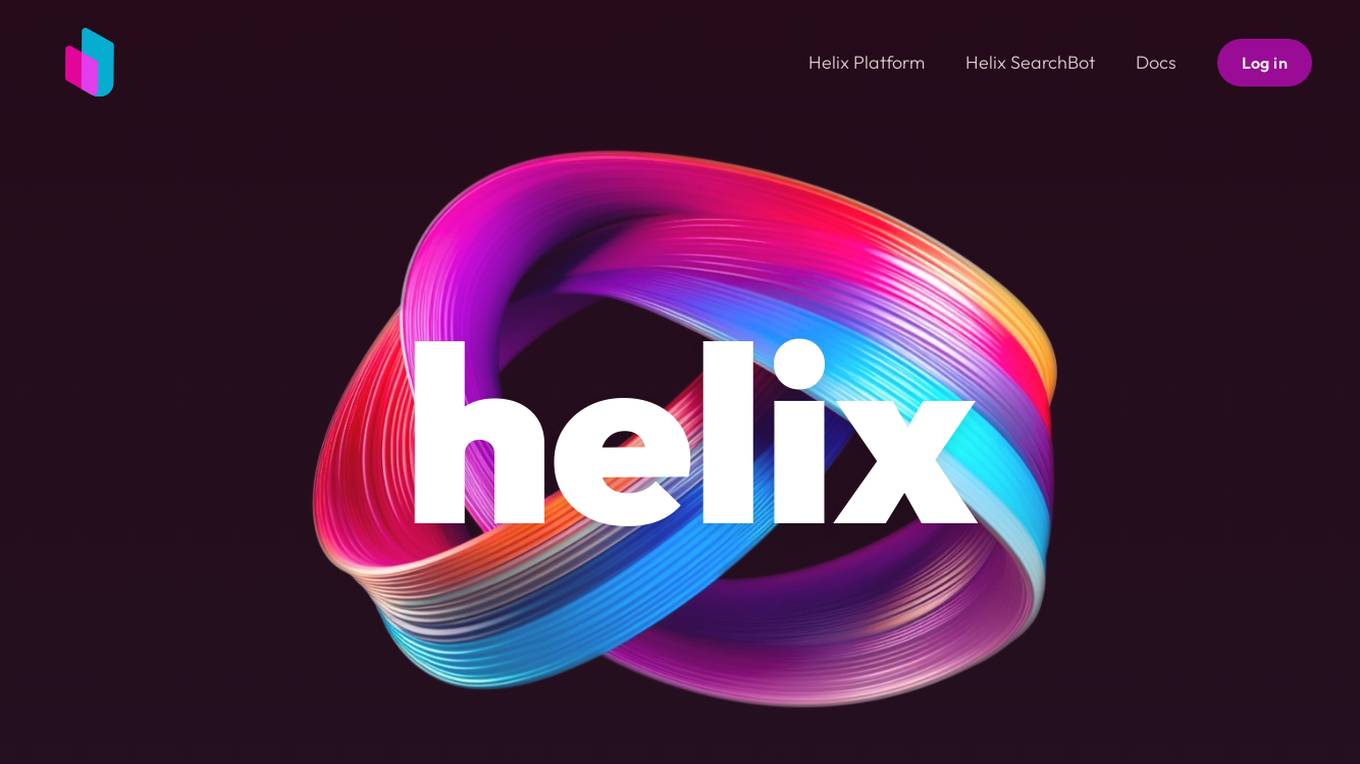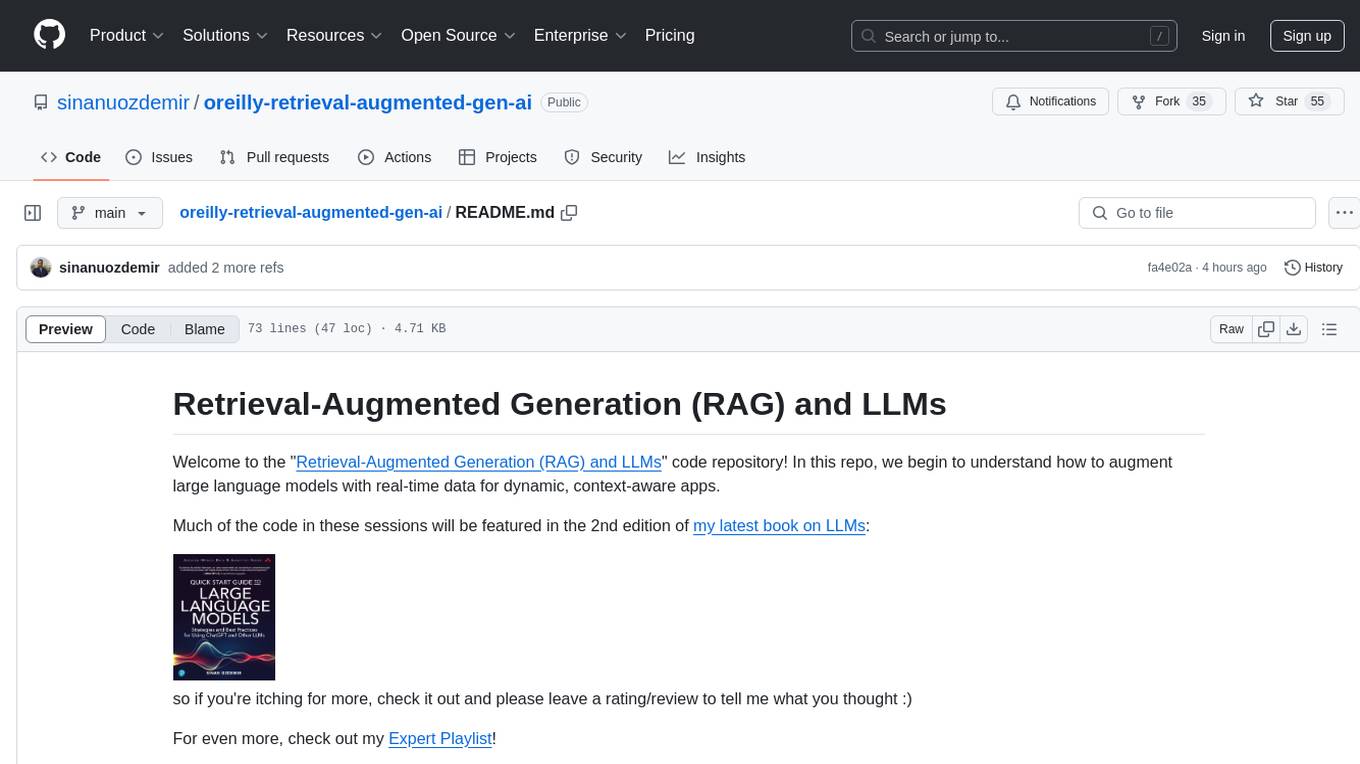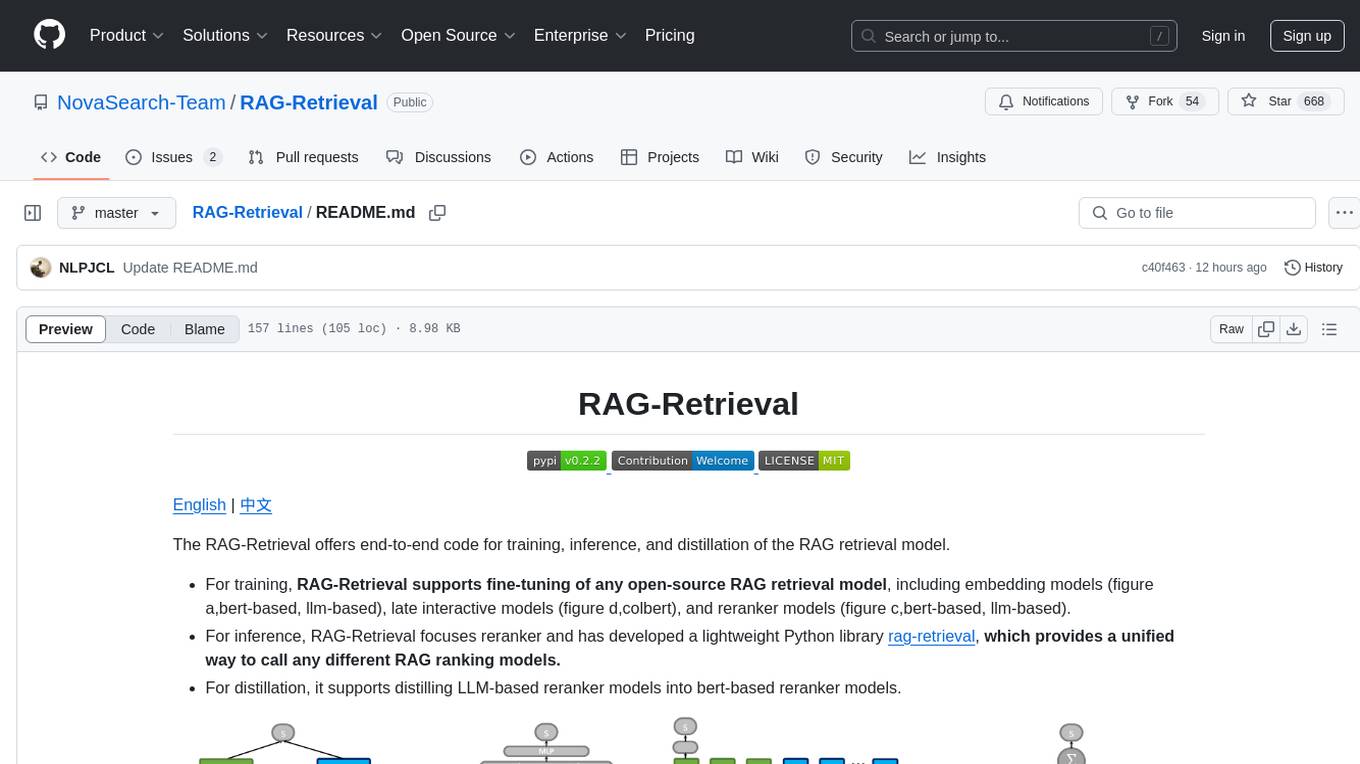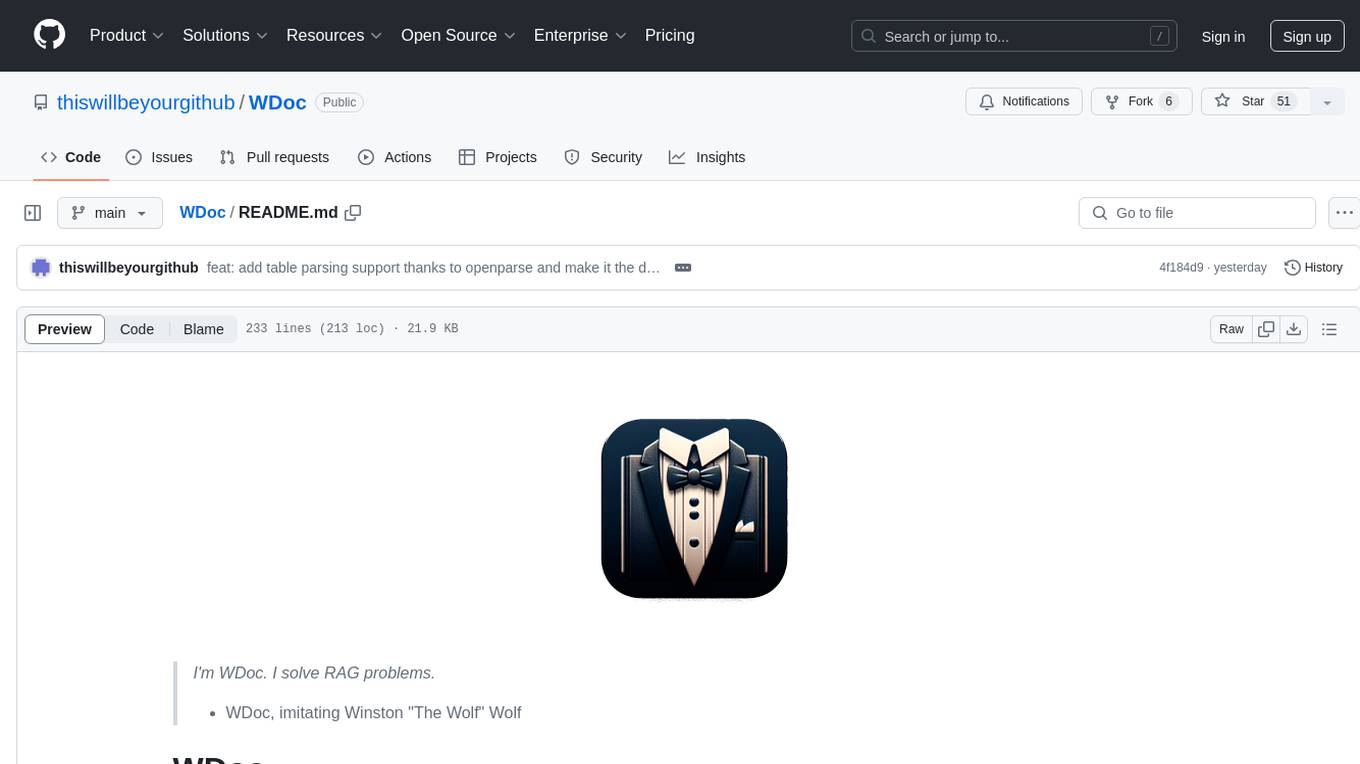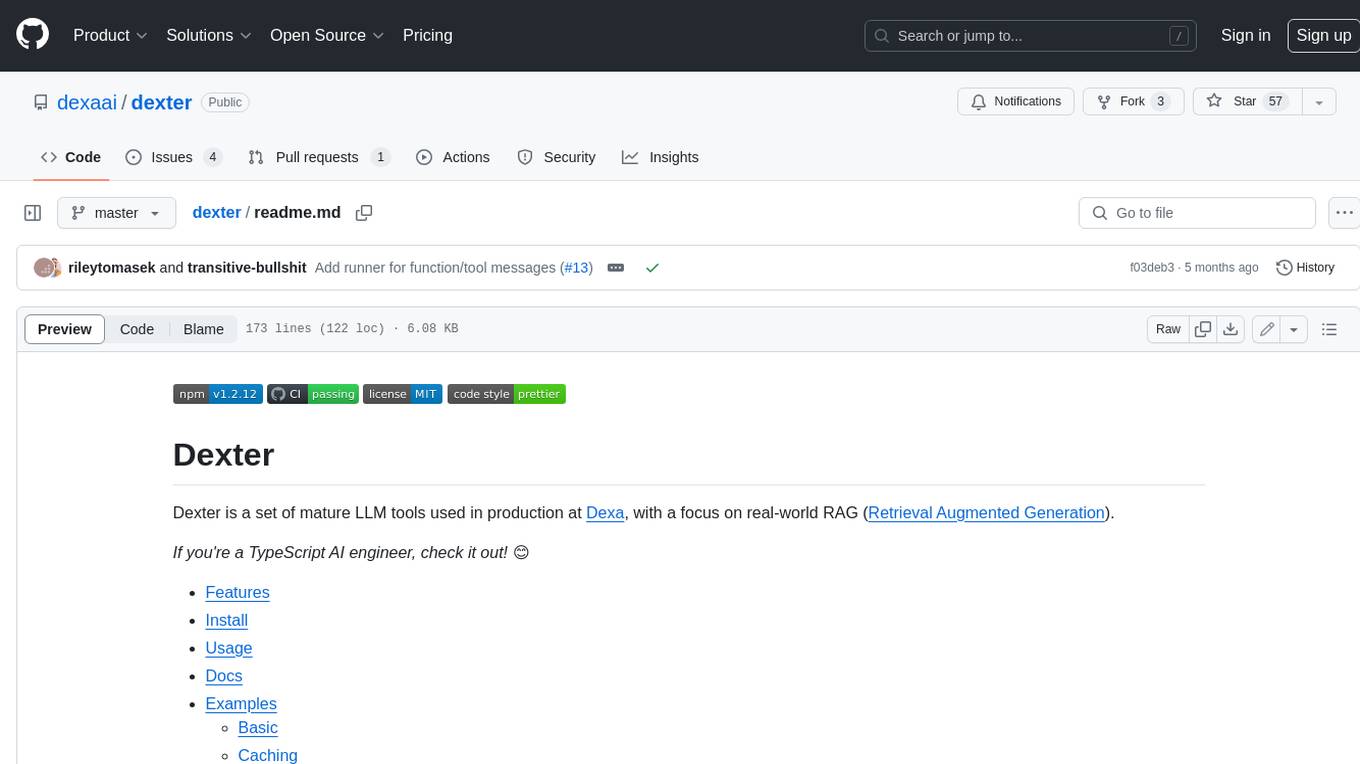AI tools for RAG (Retrieval-Augmented Generation)
Related Tools:
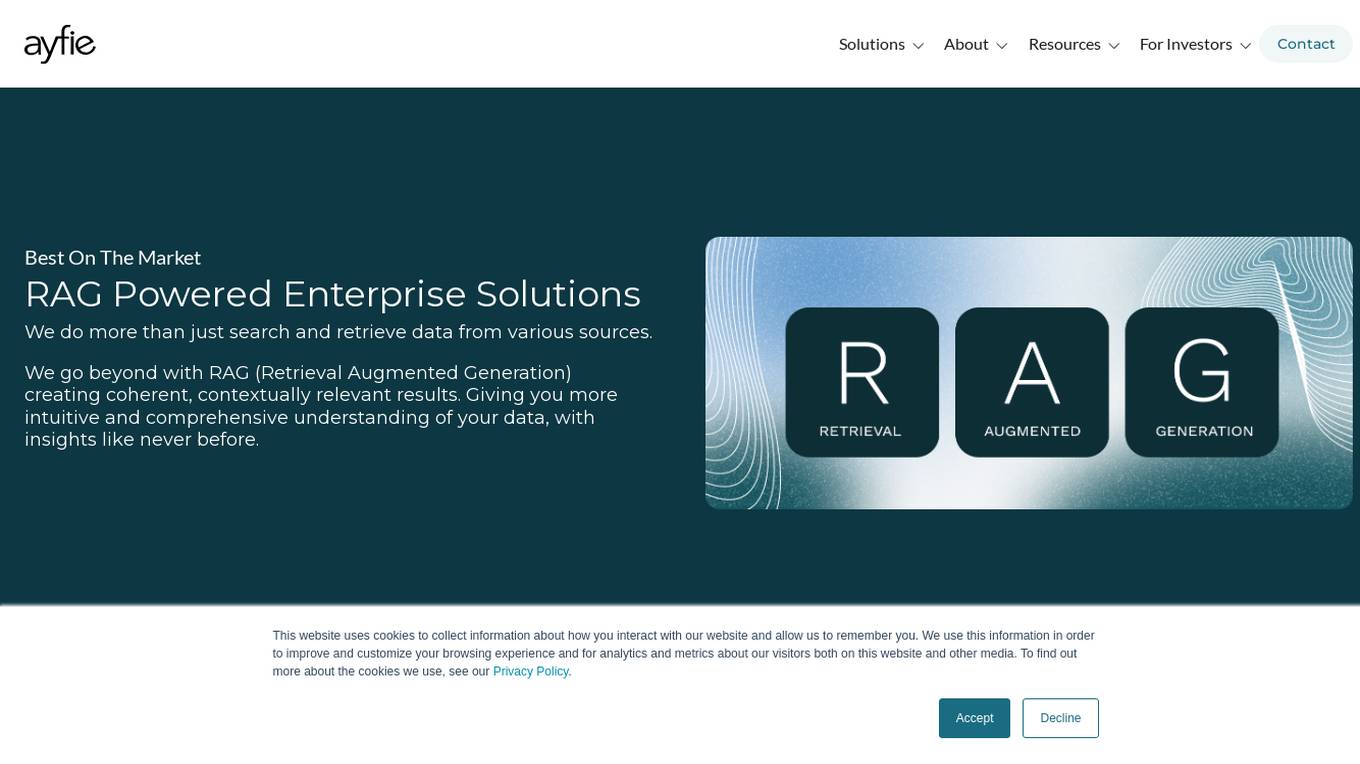
Ayfie
Ayfie is an AI-powered platform offering Retrieval-Augmented-Generation solutions. It goes beyond traditional search by utilizing RAG (Retrieval Augmented Generation) to provide coherent and contextually relevant results. Ayfie enhances AI accuracy, optimizes workflows, and offers flexible solutions for enterprise search and integration. The platform empowers businesses with generative AI capabilities, robust search engines, and secure data handling. With custom deployment options and seamless integration with existing systems, Ayfie helps organizations efficiently access and analyze large amounts of data to make data-driven decisions.
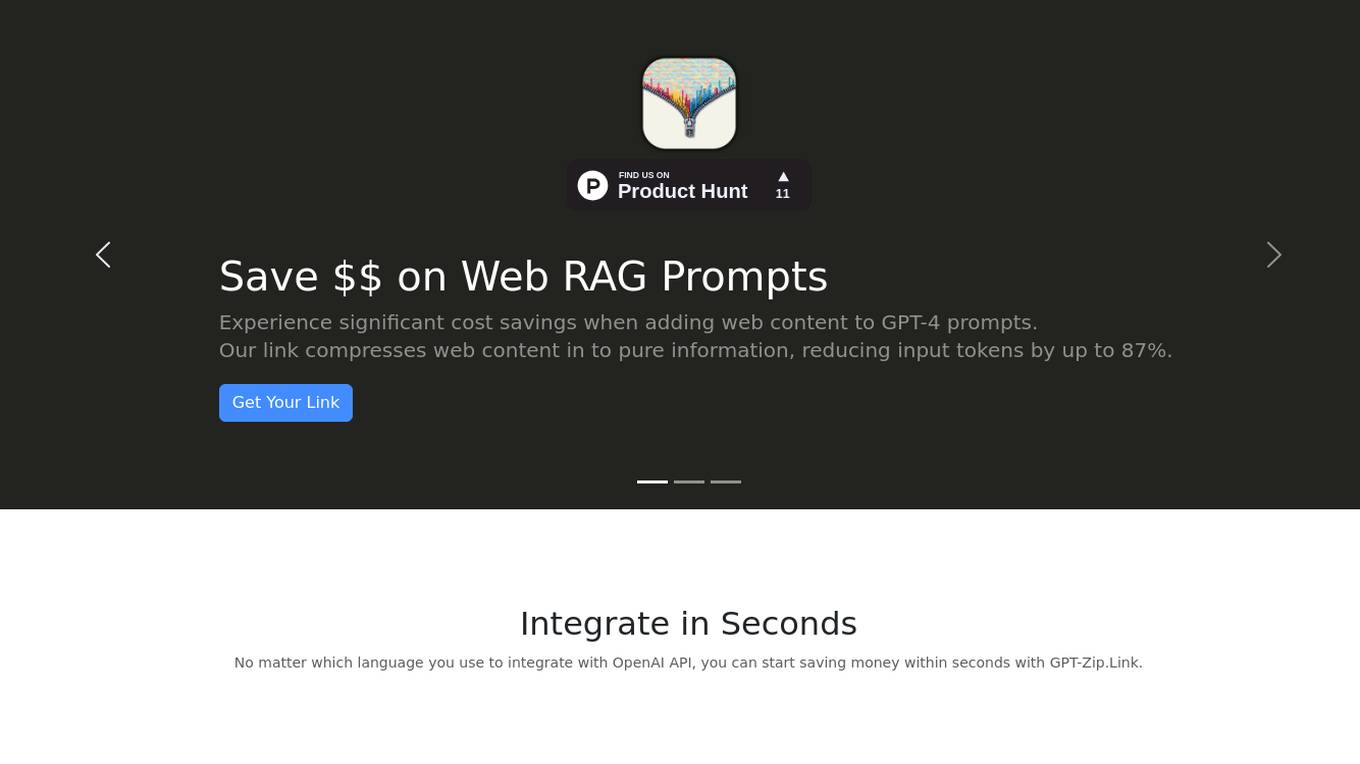
GPT-Zip
GPT-Zip is an AI tool designed to optimize web content for RAG (Retrieval-Augmented Generation) processes in GPT-4 prompts. It compresses web content into pure information, reducing input tokens by up to 87%. The tool streamlines data processing for faster and more accurate responses, enhancing the speed and performance of GPT-4. GPT-Zip employs techniques like HTML stripping, CSS and JavaScript removal, and language compression to optimize web content for efficient processing by GPT-4.
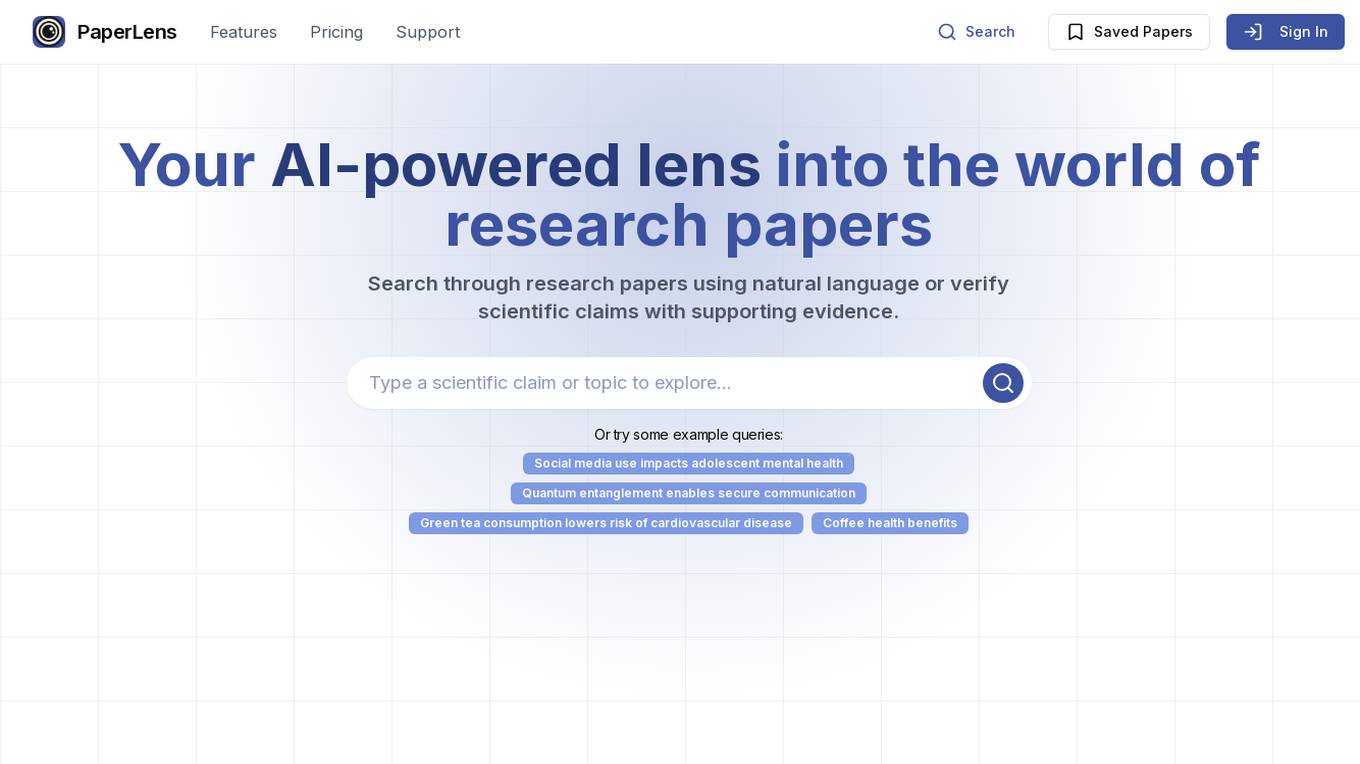
PaperLens
PaperLens is an AI-powered platform that serves as a lens into the world of research papers. It allows users to search through research papers using natural language or verify scientific claims with supporting evidence. The platform combines cutting-edge AI technology with intuitive design to help users find the most relevant academic research. PaperLens leverages state-of-the-art RAG (Retrieval-Augmented Generation) technology for precise, real-time results. Users can find relevant research papers based on meaning and context, filter results by publication date and relevance score, and benefit from simple, transparent pricing plans.
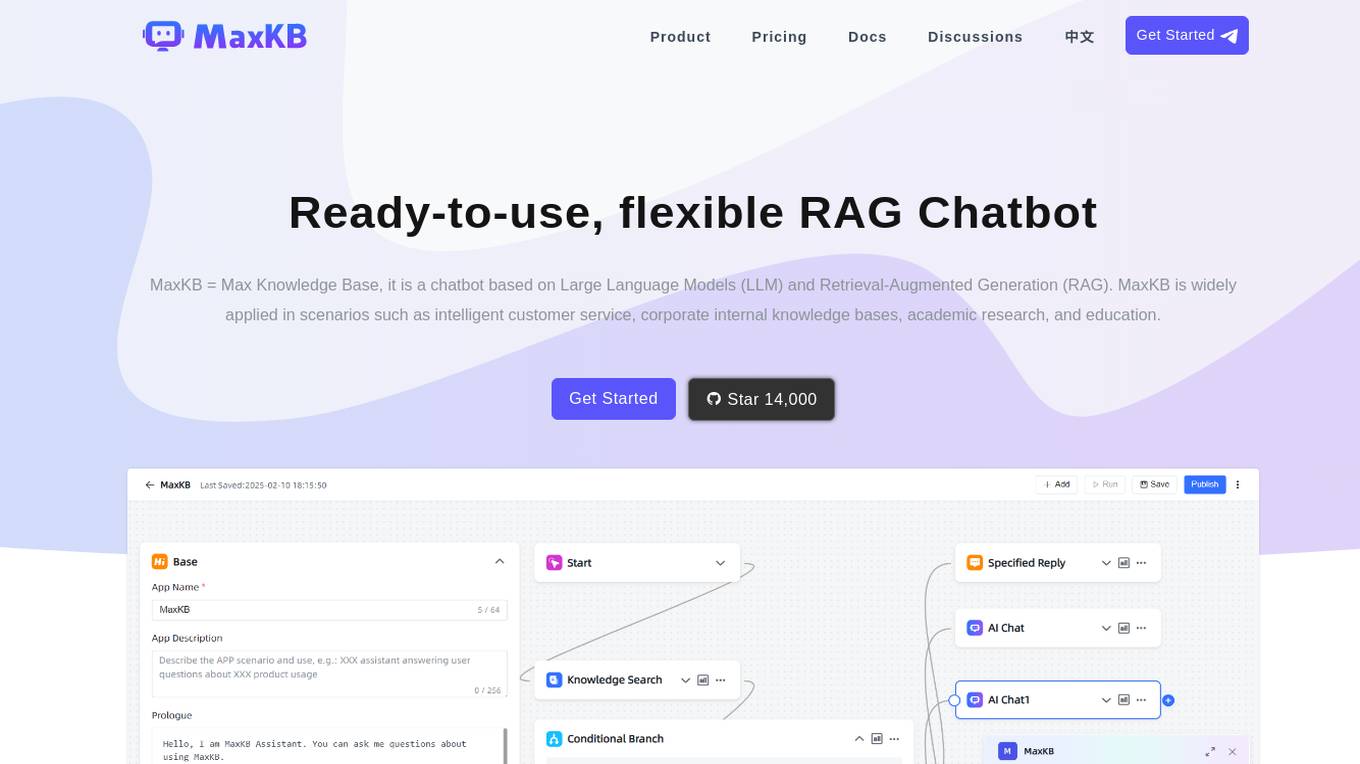
MaxKB
MaxKB is a ready-to-use, flexible RAG Chatbot that is based on Large Language Models (LLM) and Retrieval-Augmented Generation (RAG). It is widely applied in scenarios such as intelligent customer service, corporate internal knowledge bases, academic research, and education. MaxKB supports direct uploading of documents, automatic crawling of online documents, automatic text splitting, vectorization, and RAG for smart Q&A interactions. It also offers flexible orchestration, seamless integration into third-party systems, and supports various large models for enhanced user satisfaction.

Krux AI
Krux AI is an advanced artificial intelligence tool designed to streamline and optimize various business processes. It leverages cutting-edge machine learning algorithms to provide actionable insights and predictions for data-driven decision-making. With its user-friendly interface and powerful capabilities, Krux AI empowers users to enhance efficiency, productivity, and profitability across different industries.
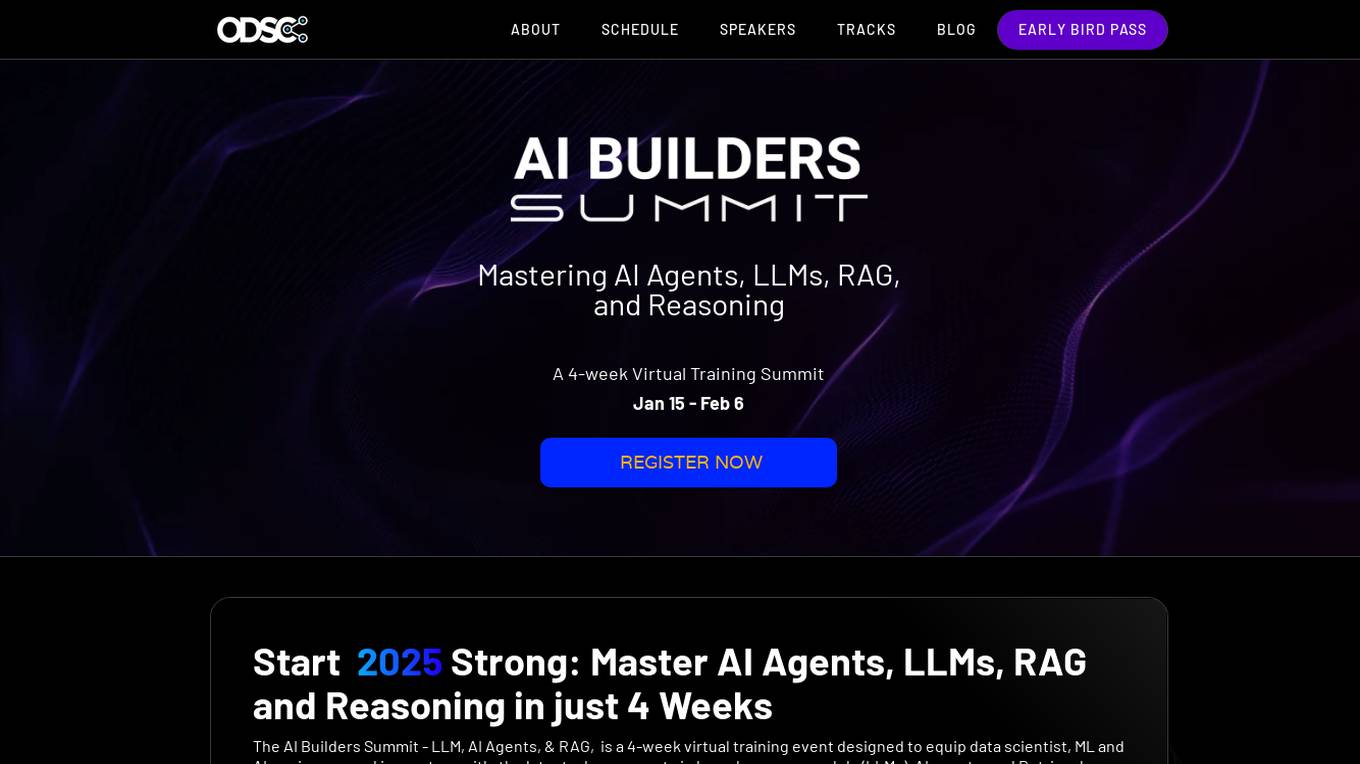
AI Builders Summit
AI Builders Summit is a 4-week virtual training event designed to equip data scientists, ML and AI engineers, and innovators with the latest advancements in large language models (LLMs), AI agents, and Retrieval-Augmented Generation (RAG). The summit emphasizes hands-on learning and real-world applications, with interactive workshops, platform credits, and direct exposure to industry-leading tools. Attendees can learn progressively over four weeks, building practical skills through expert-led sessions, cutting-edge tools, and industry insights.
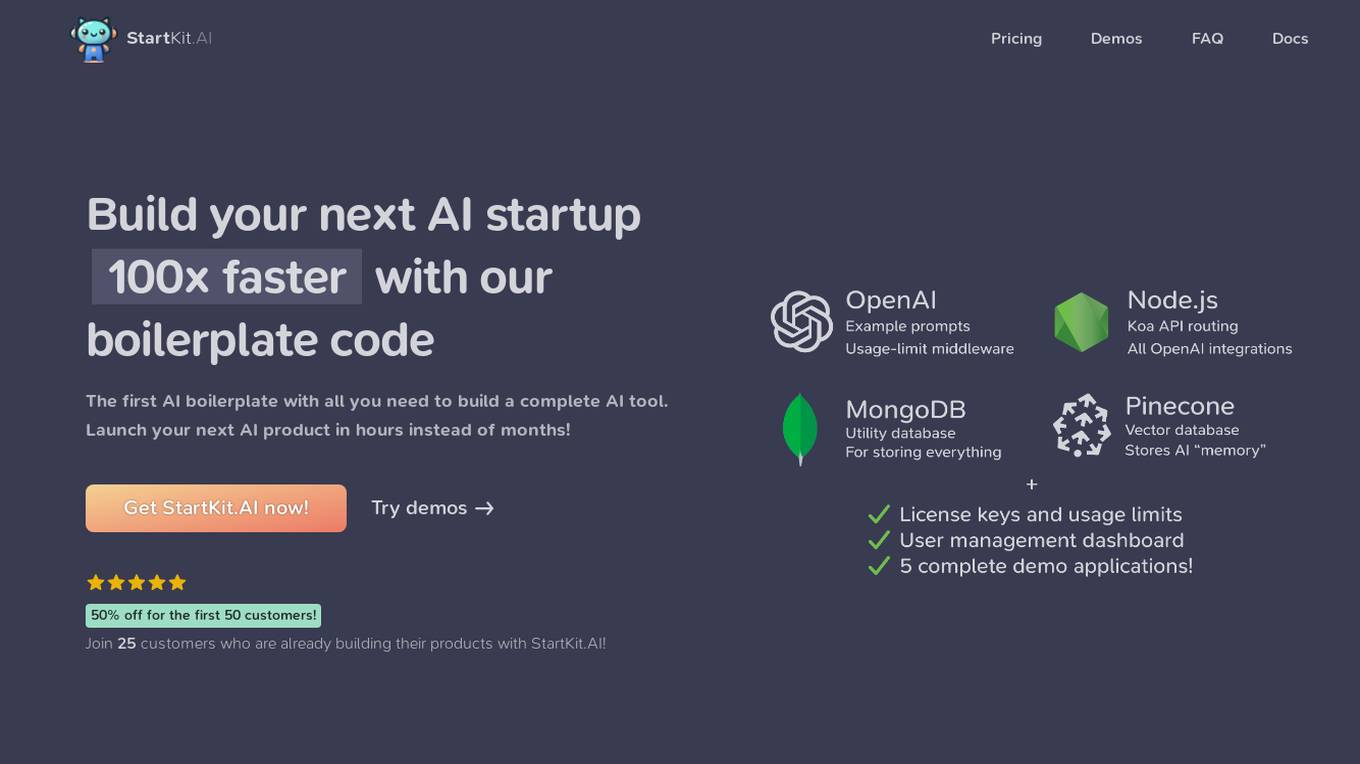
StartKit.AI
StartKit.AI is a boilerplate code for AI products that helps users build their AI startups 100x faster. It includes pre-built REST API routes for all common AI functionality, a pre-configured Pinecone for text embeddings and Retrieval-Augmented Generation (RAG) for chat endpoints, and five React demo apps to help users get started quickly. StartKit.AI also provides a license key and magic link authentication, user & API limit management, and full documentation for all its code. Additionally, users get access to guides to help them get set up and one year of updates.
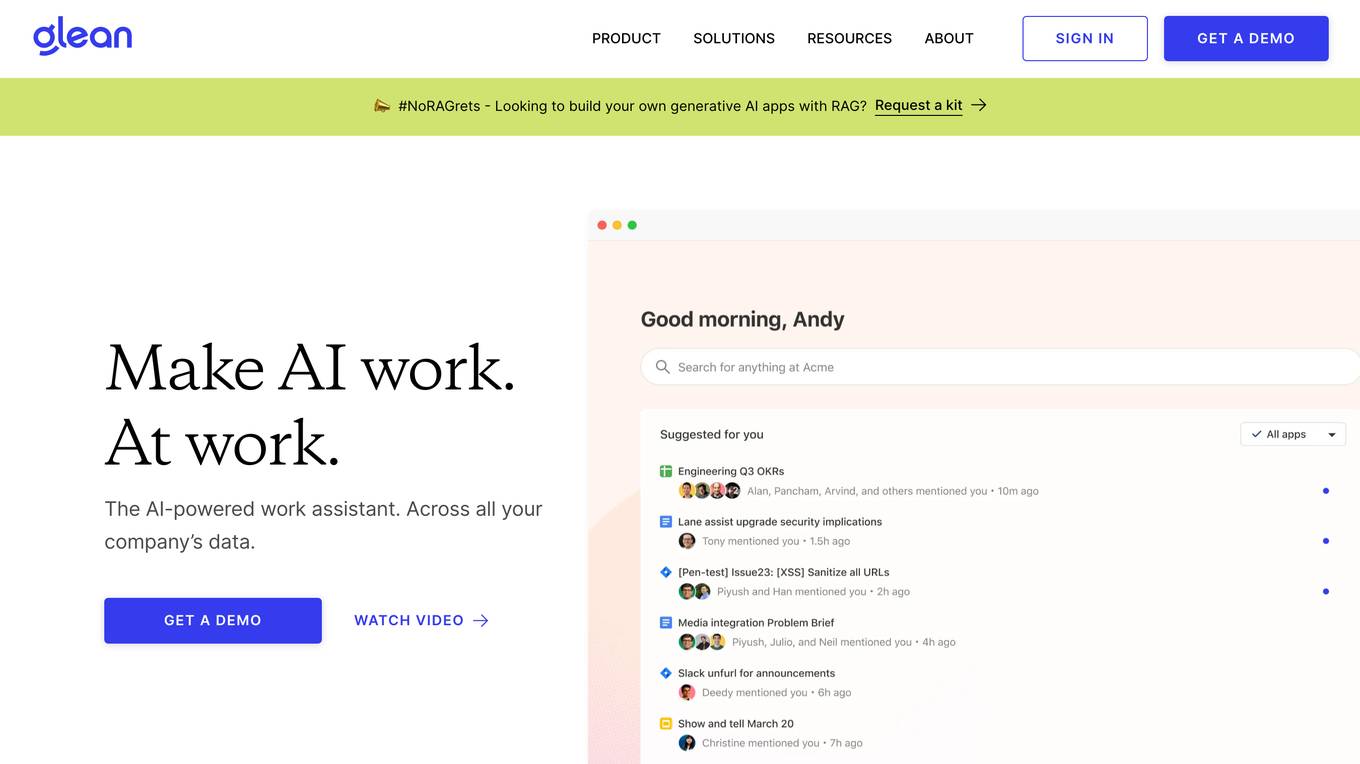
Glean
Glean is an AI-powered work assistant that helps teams harness generative AI and make better decisions faster. It connects all of your company's data across all of the content, people, and interactions in your organization. Glean's advanced personalization ensures that answers are tailored to who you are, who you work with, and what you're working on. Its Retrieval Augmented Generation (RAG) retrieves the most relevant information and ensures that LLMs answer with the most up-to-date knowledge.
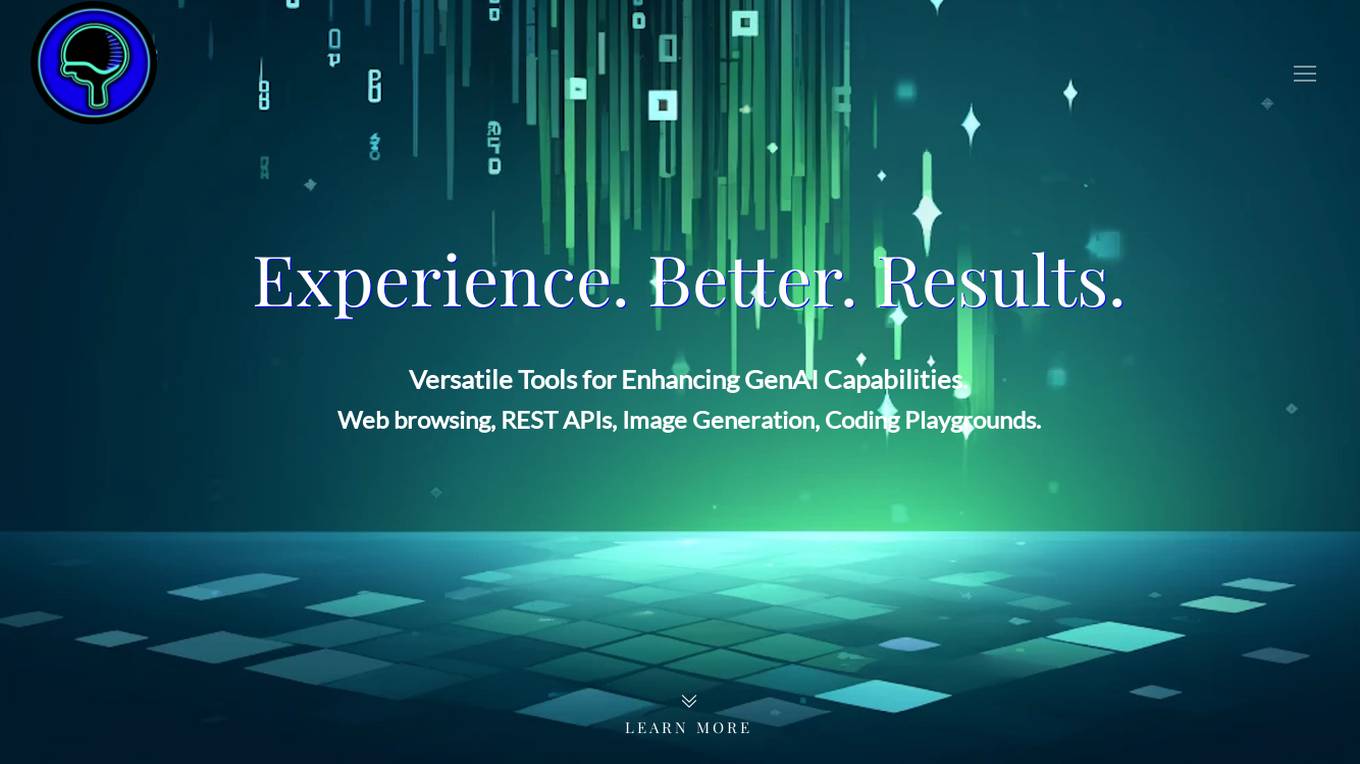
WeGPT.ai
WeGPT.ai is an AI tool that focuses on enhancing Generative AI capabilities through Retrieval Augmented Generation (RAG). It provides versatile tools for web browsing, REST APIs, image generation, and coding playgrounds. The platform offers consumer and enterprise solutions, multi-vendor support, and access to major frontier LLMs. With a comprehensive approach, WeGPT.ai aims to deliver better results, user experience, and cost efficiency by keeping AI models up-to-date with the latest data.
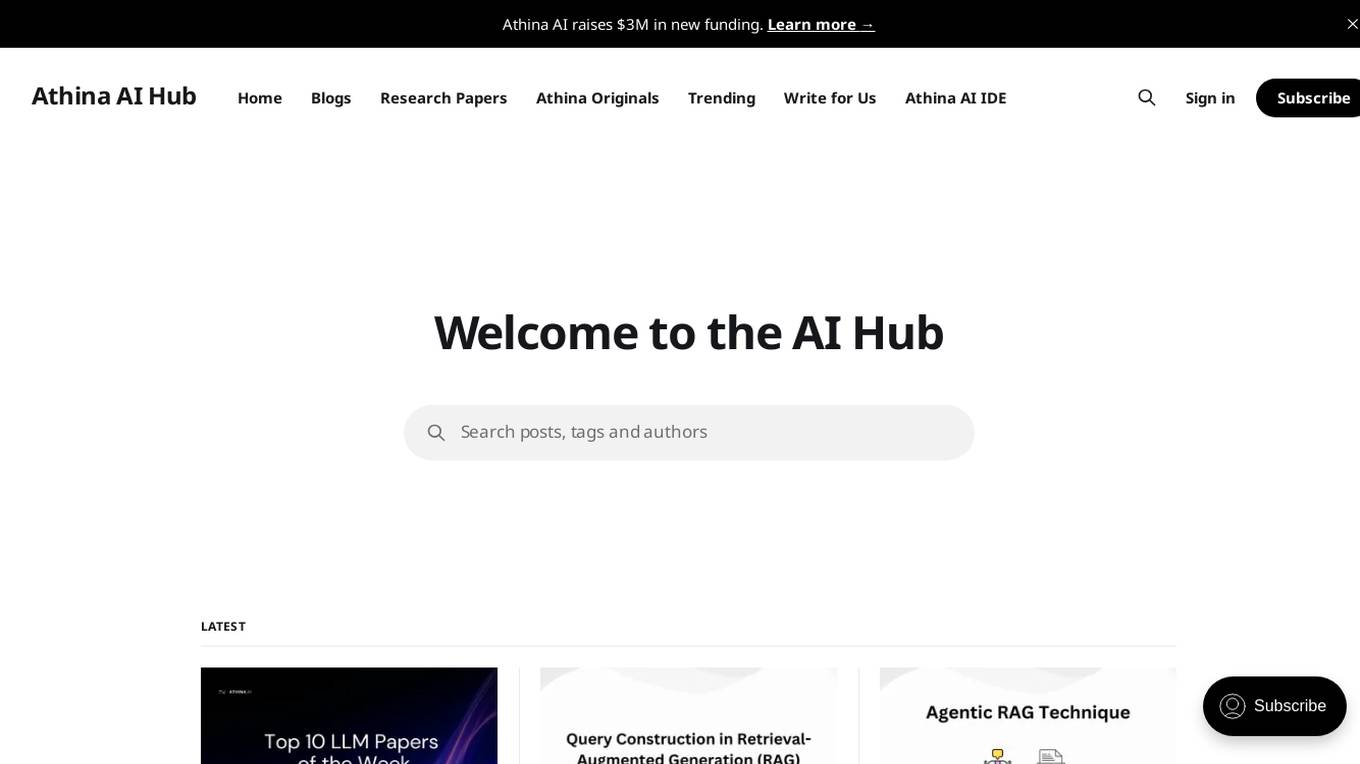
Athina AI Hub
Athina AI Hub is an ultimate resource for AI development teams, offering a wide range of AI development blogs, research papers, and original content. It provides valuable insights into cutting-edge technologies such as Large Language Models (LLMs), Retrieval-Augmented Generation (RAG), and AI agents. Athina AI Hub aims to empower AI engineers, researchers, data scientists, and product developers by offering comprehensive resources and fostering innovation in the field of Artificial Intelligence.

Glean
Glean is an AI-powered work assistant and enterprise search platform that enables teams to harness generative AI to make better decisions faster. It connects all company data, provides advanced personalization, and ensures retrieval of the most relevant information. Glean offers responsible AI solutions that scale to businesses, respecting permissions and providing secure, private, and fully referenceable answers. With turnkey deployment and a variety of platform tools, Glean helps teams move faster and be more productive.
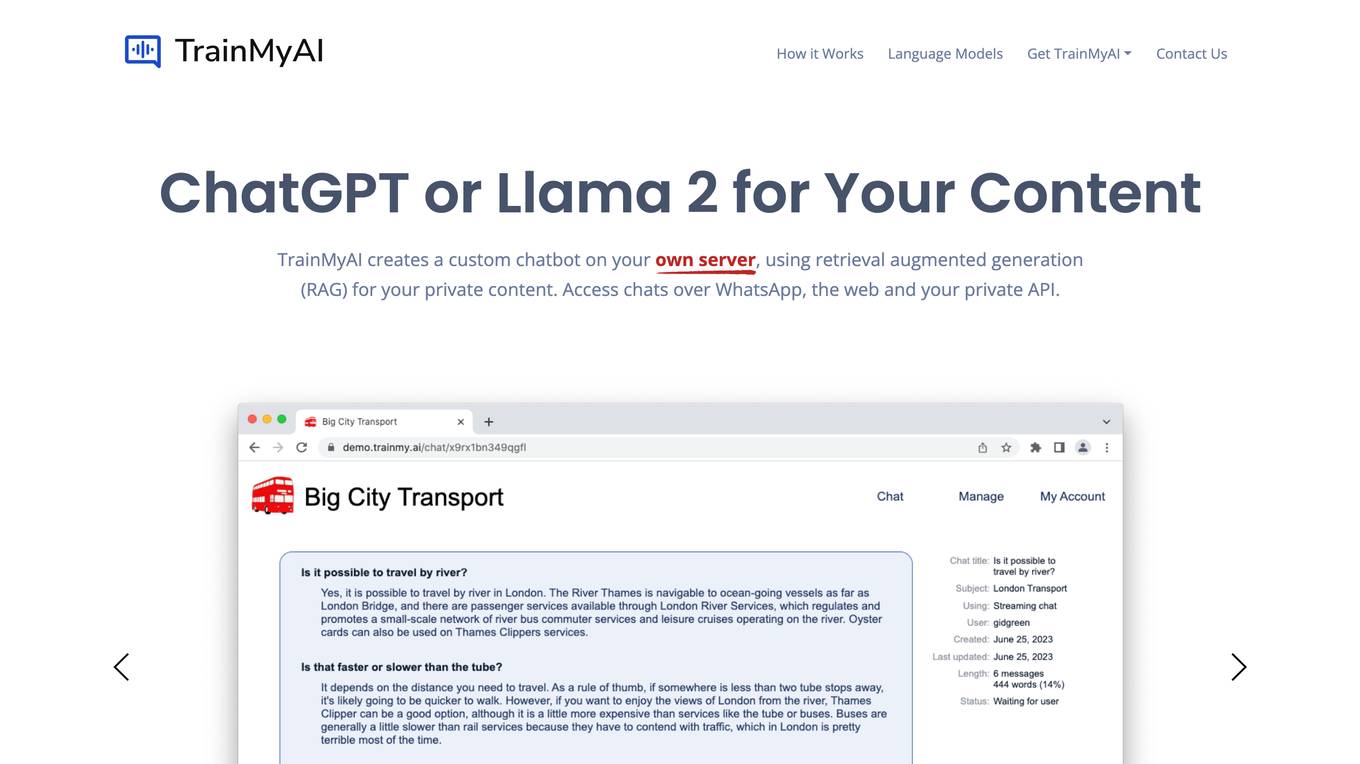
TrainMyAI
TrainMyAI is a comprehensive solution for creating AI chatbots using retrieval augmented generation (RAG) technology. It allows users to build custom AI chatbots on their servers, enabling interactions over WhatsApp, web, and private APIs. The platform offers deep customization options, fine-grained user management, usage history tracking, content optimization, and linked citations. With TrainMyAI, users can maintain full control over their AI models and data, either on-premise or in the cloud.
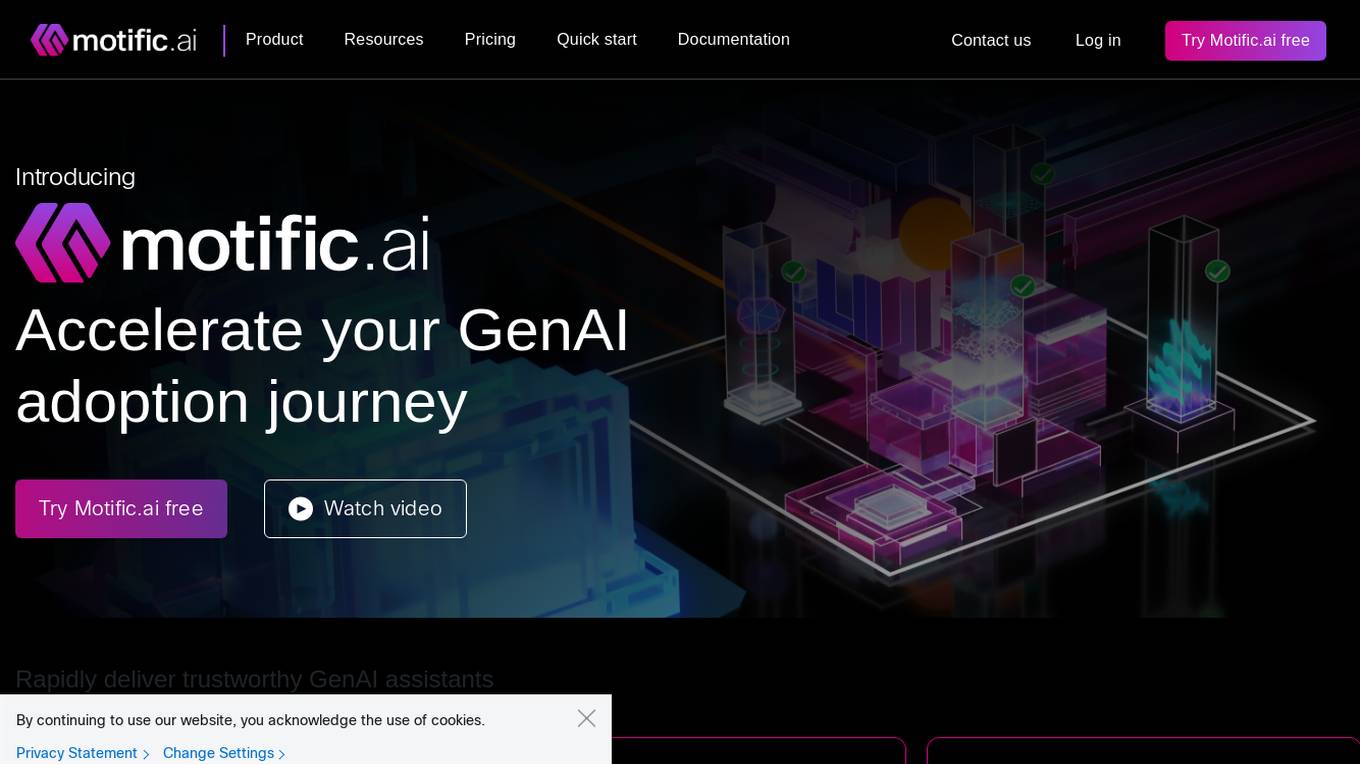
Motific.ai
Motific.ai is a responsible GenAI tool powered by data at scale. It offers a fully managed service with natural language compliance and security guardrails, an intelligence service, and an enterprise data-powered, end-to-end retrieval augmented generation (RAG) service. Users can rapidly deliver trustworthy GenAI assistants and API endpoints, configure assistants with organization's data, optimize performance, and connect with top GenAI model providers. Motific.ai enables users to create custom knowledge bases, connect to various data sources, and ensure responsible AI practices. It supports English language only and offers insights on usage, time savings, and model optimization.
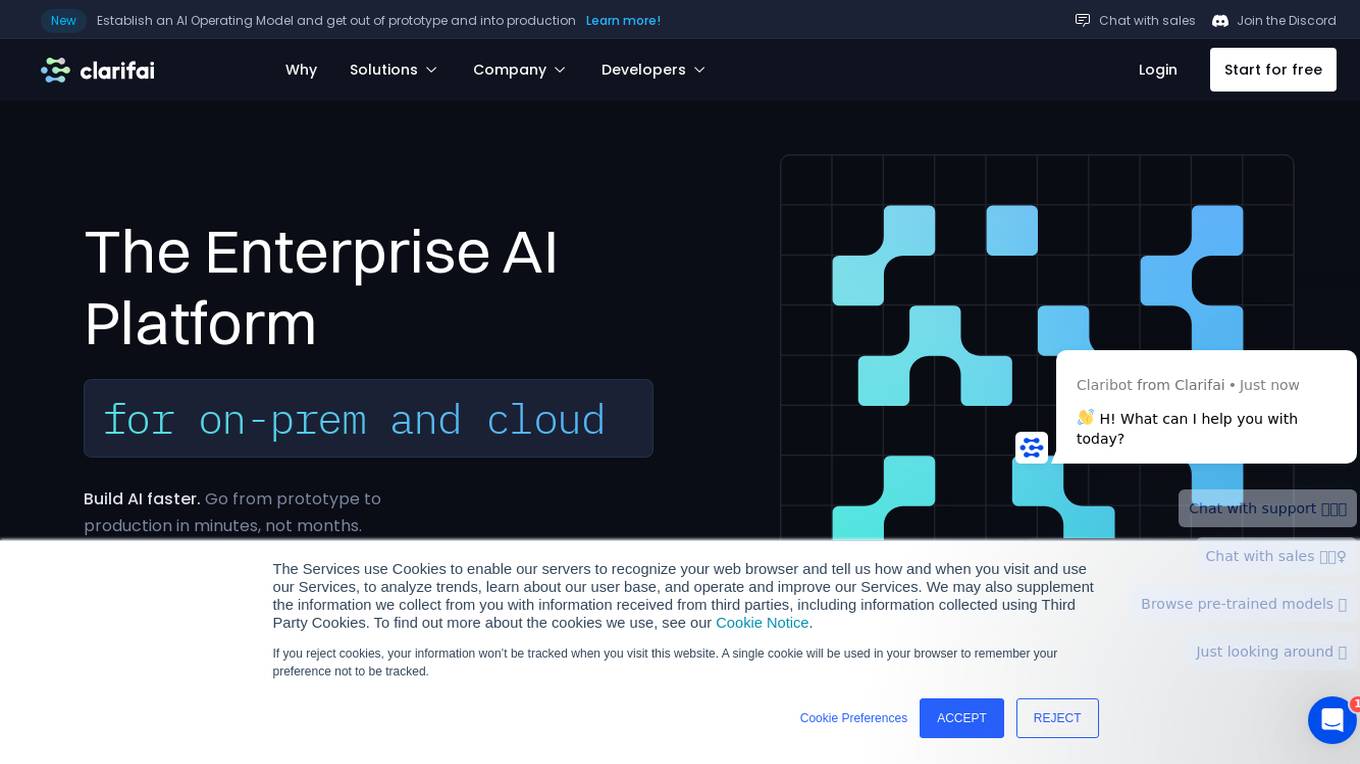
Clarifai
Clarifai is an AI Workflow Orchestration Platform that helps businesses establish an AI Operating Model and transition from prototype to production efficiently. It offers end-to-end solutions for operationalizing AI, including Retrieval Augmented Generation (RAG), Generative AI, Digital Asset Management, Visual Inspection, Automated Data Labeling, and Content Moderation. Clarifai's platform enables users to build and deploy AI faster, reduce development costs, ensure oversight and security, and unlock AI capabilities across the organization. The platform simplifies data labeling, content moderation, intelligence & surveillance, generative AI, content organization & personalization, and visual inspection. Trusted by top enterprises, Clarifai helps companies overcome challenges in hiring AI talent and misuse of data, ultimately leading to AI success at scale.
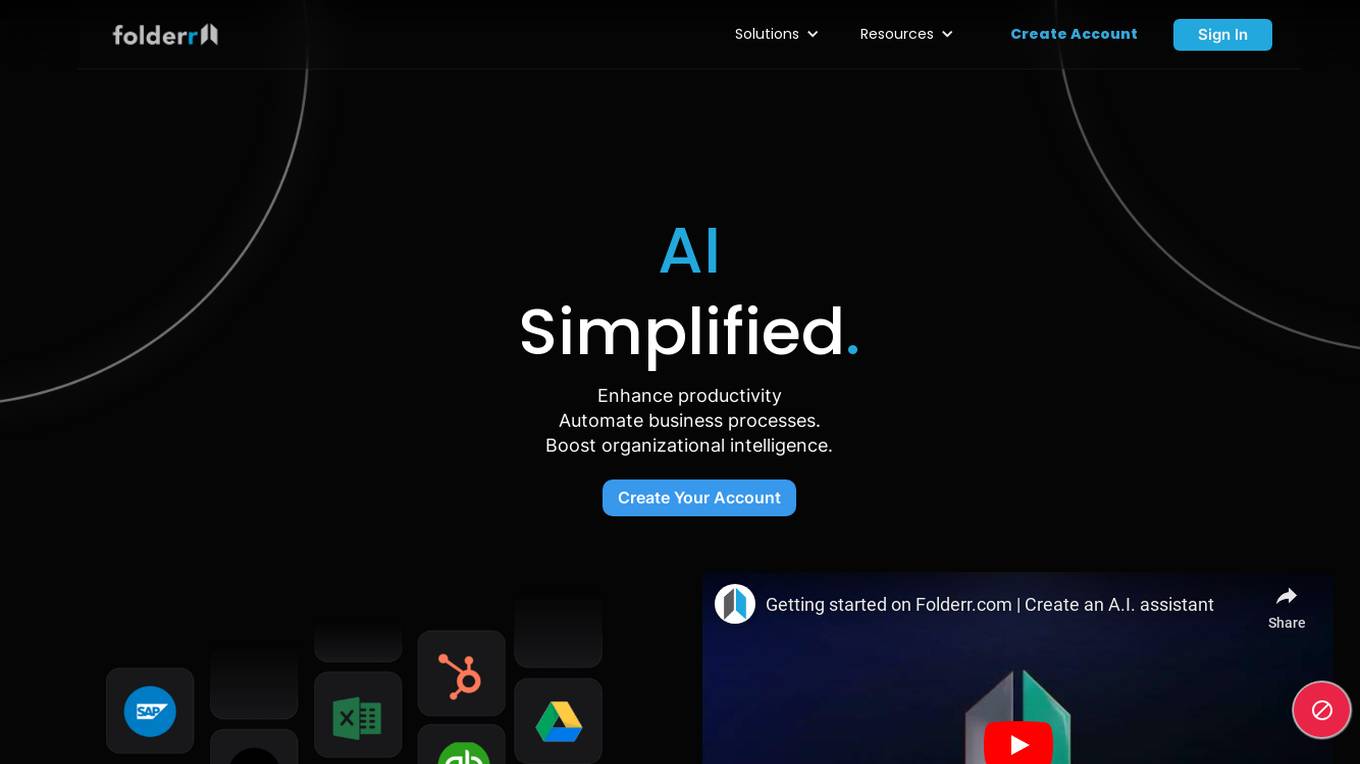
Folderr
Folderr.com is an AI platform that simplifies AI solutions by offering AI assistants, AI automations, and AI chatbots. The platform integrates cutting-edge Language Models (LLMs) and Retrieval-Augmented Generation (RAG) technology to transform business data management and decision-making. Folderr allows users to create AI-powered assistants and chatbots, automate business processes, and enhance productivity. The platform is designed to process various document types, including CSV and XLSX files, to derive critical insights from financial documents. Folderr also provides smart integrations, workflow automations, and secure data sharing options for teams and businesses.
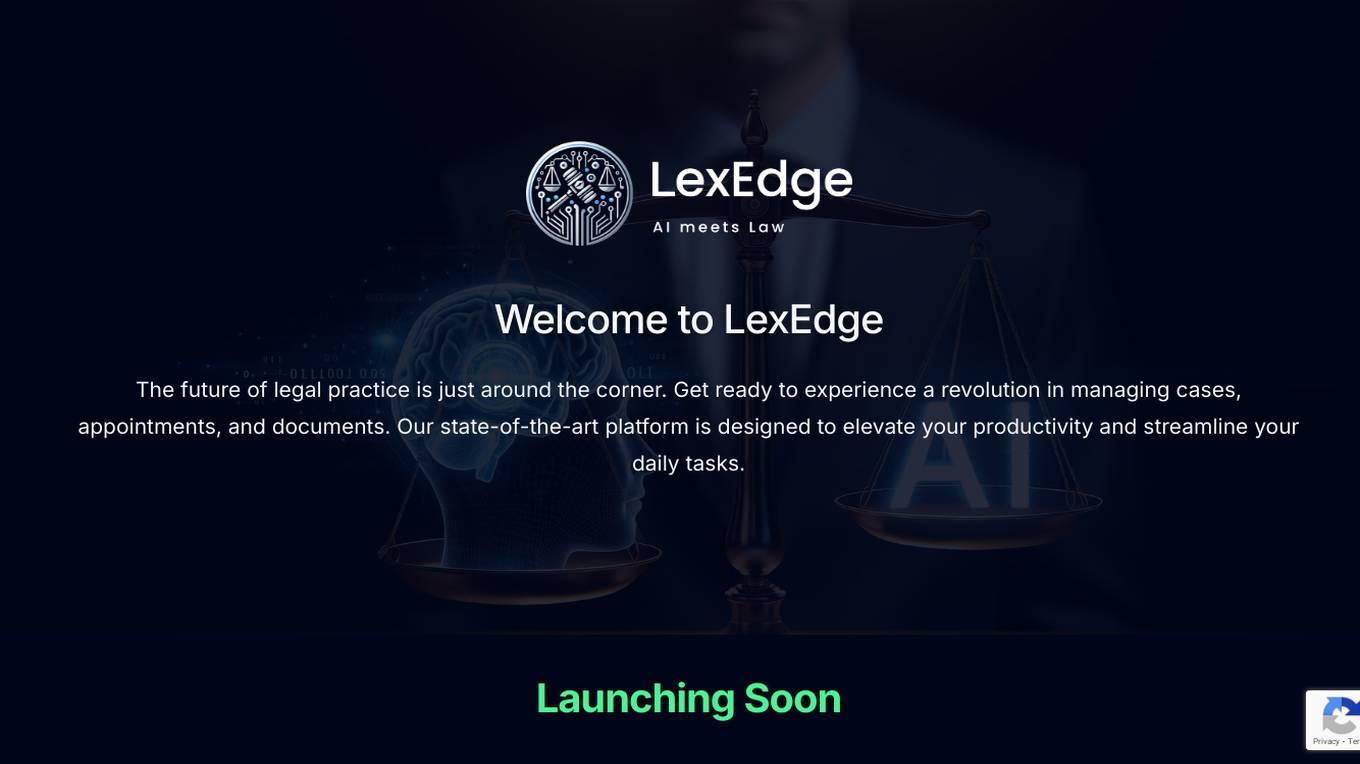
LexEdge
LexEdge is an AI-powered legal practice management solution that revolutionizes how legal professionals handle their responsibilities. It offers advanced features like case tracking, client communications, AI chatbot assistance, document automation, task management, and detailed reporting and analytics. LexEdge enhances productivity, accuracy, and client satisfaction by leveraging technologies such as AI, large language models (LLM), retrieval-augmented generation (RAG), fine-tuning, and custom model training. It caters to solo practitioners, small and large law firms, and corporate legal departments, providing tailored solutions to meet their unique needs.
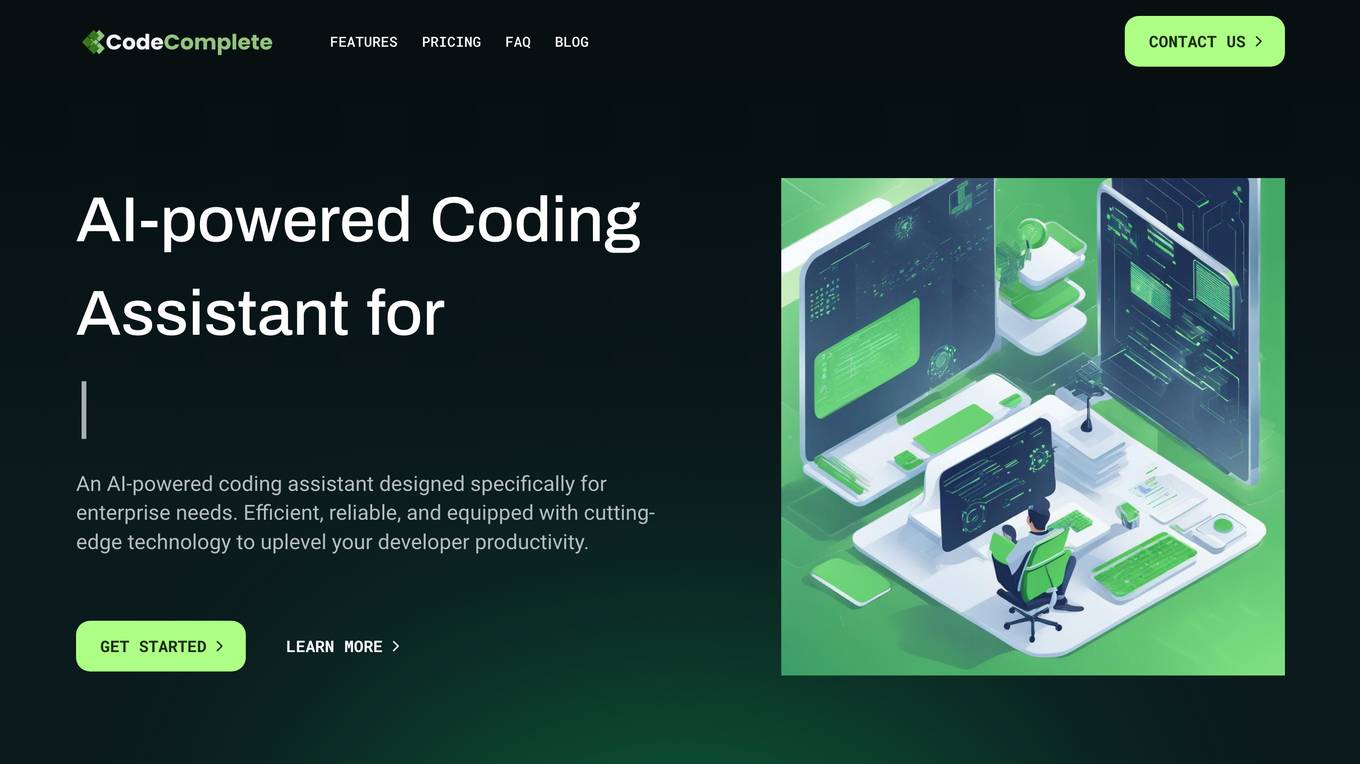
CodeComplete
CodeComplete is an AI-powered coding assistant designed specifically for enterprise needs. It is efficient, reliable, and equipped with cutting-edge technology to improve developer productivity. CodeComplete offers a comprehensive suite of coding tools to improve end-to-end developer workflow, including code generation, code chat, automated unit test generation, automated documentation, and refactoring & migrations.
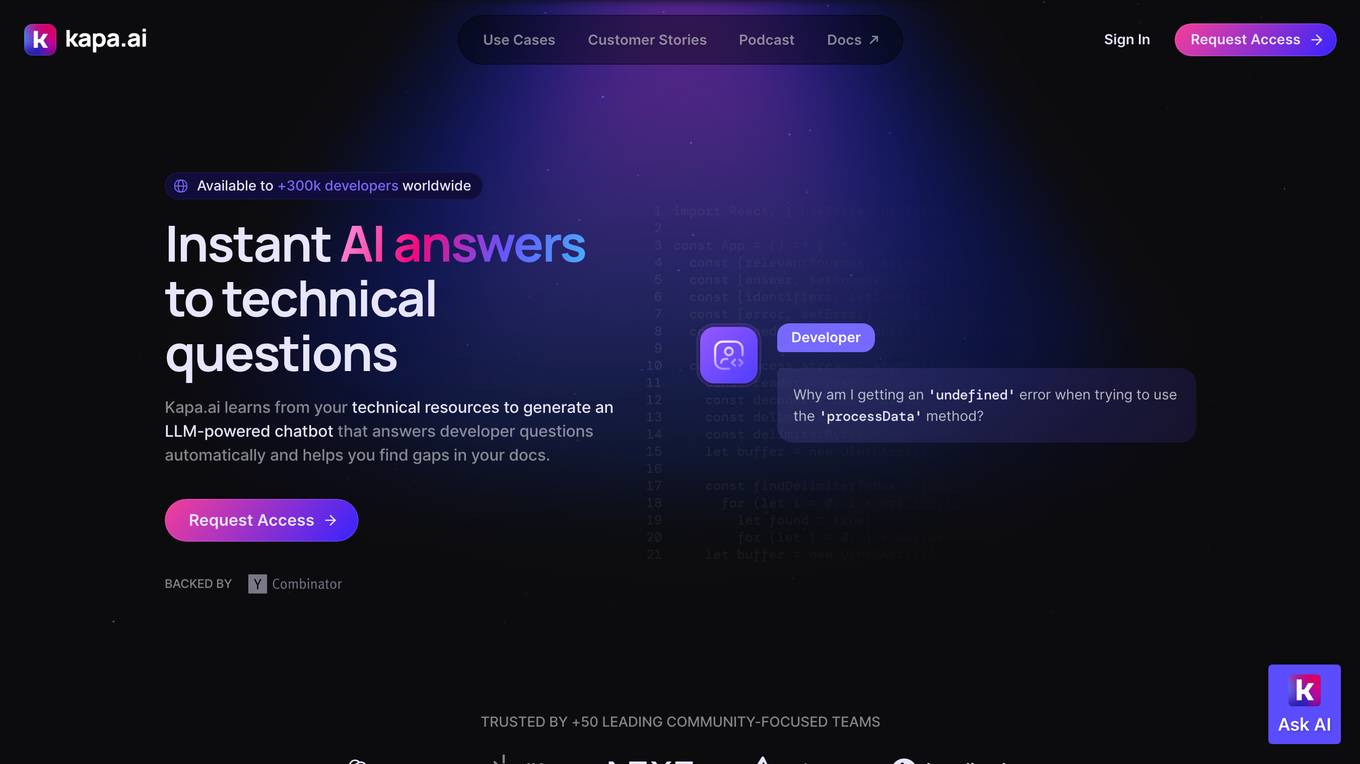
Kapa.ai
Kapa.ai is an AI tool that transforms technical documentation and knowledge bases into a reliable, LLM-powered AI assistant. It provides precise, context-specific answers, identifies documentation gaps, and integrates effortlessly with various platforms. Trusted by leading companies, Kapa.ai is designed for organizations with technical products, offering accuracy, rapid deployment features, and enterprise-grade security.

Fluid AI
Fluid AI is an Enterprise Generative AI Solution Platform that offers advanced capabilities for Enterprise use-cases. It leverages organizational knowledge to function as an intelligent agent, supporting teams with easy access to precise answers, insights, reports, and creativity. The platform automates conversations across channels, enhances speed, accuracy, and scalability, and maintains personalized interactions. Fluid AI can integrate seamlessly with legacy systems, ensuring efficient AI adoption with Enterprise-level security.
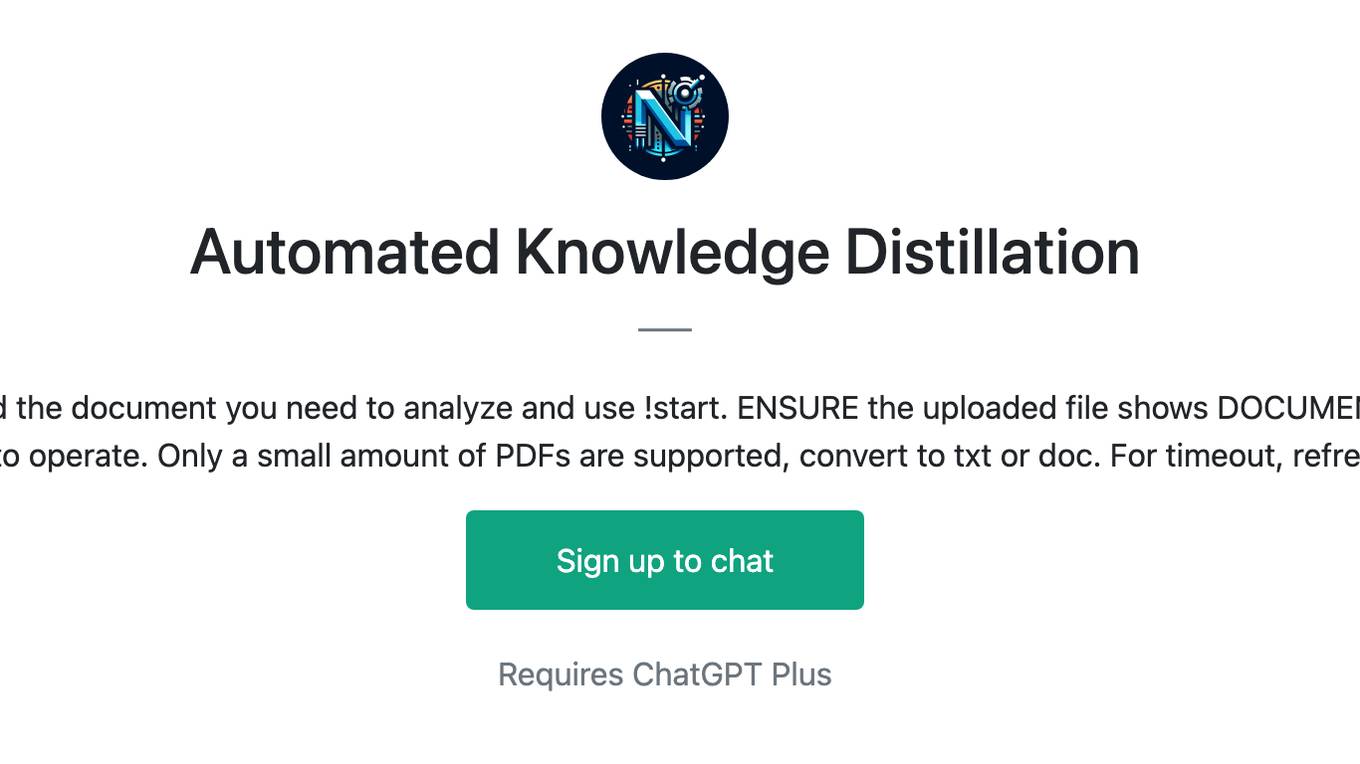
Automated Knowledge Distillation
For strategic knowledge distillation, upload the document you need to analyze and use !start. ENSURE the uploaded file shows DOCUMENT and NOT PDF. This workflow requires leveraging RAG to operate. Only a small amount of PDFs are supported, convert to txt or doc. For timeout, refresh & !continue
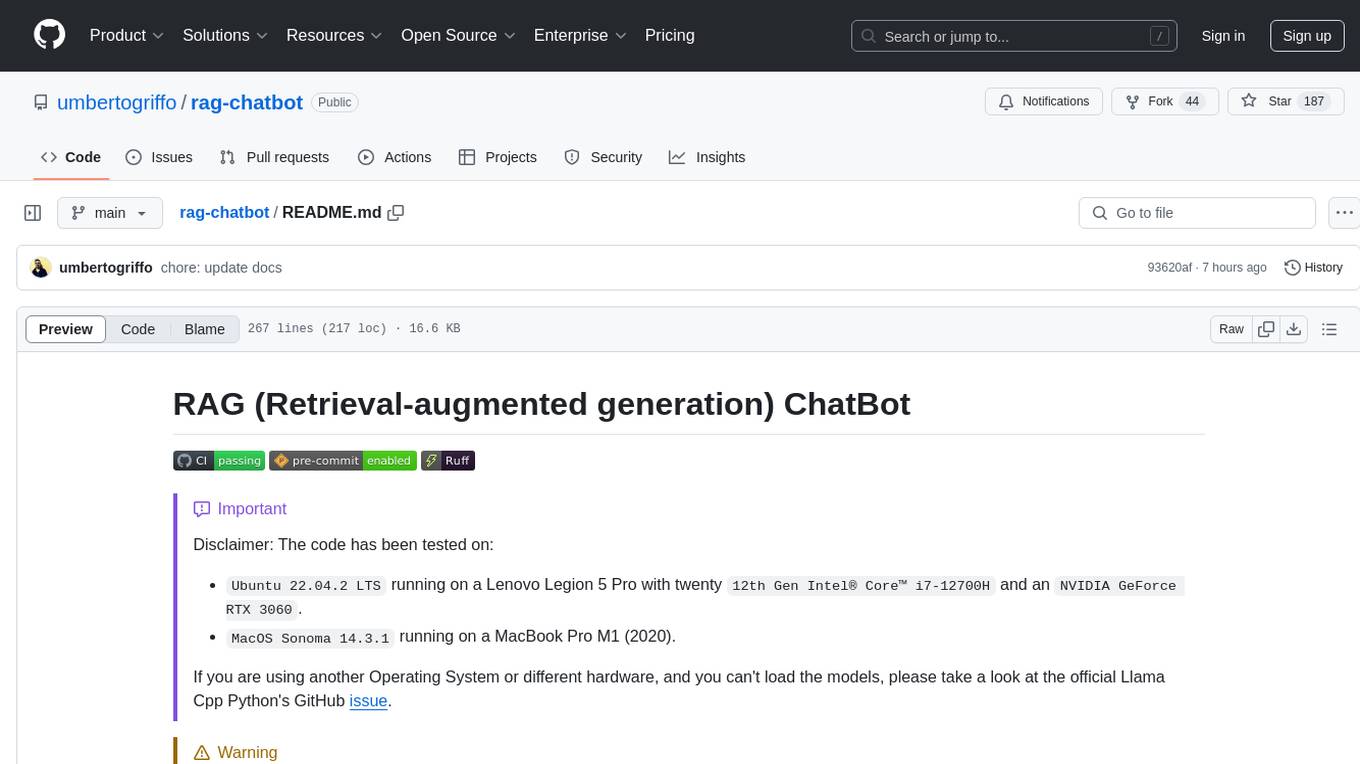
rag-chatbot
The RAG ChatBot project combines Lama.cpp, Chroma, and Streamlit to build a Conversation-aware Chatbot and a Retrieval-augmented generation (RAG) ChatBot. The RAG Chatbot works by taking a collection of Markdown files as input and provides answers based on the context provided by those files. It utilizes a Memory Builder component to load Markdown pages, divide them into sections, calculate embeddings, and save them in an embedding database. The chatbot retrieves relevant sections from the database, rewrites questions for optimal retrieval, and generates answers using a local language model. It also remembers previous interactions for more accurate responses. Various strategies are implemented to deal with context overflows, including creating and refining context, hierarchical summarization, and async hierarchical summarization.
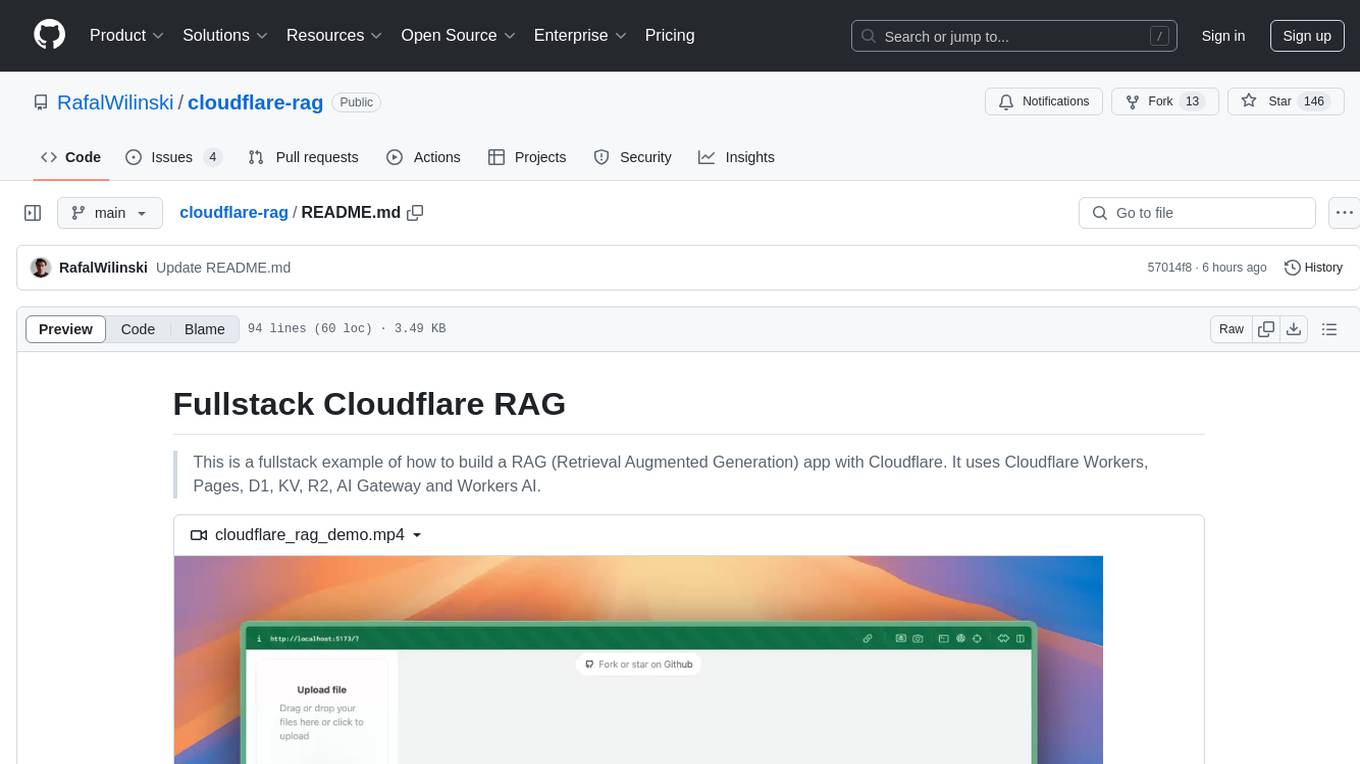
cloudflare-rag
This repository provides a fullstack example of building a Retrieval Augmented Generation (RAG) app with Cloudflare. It utilizes Cloudflare Workers, Pages, D1, KV, R2, AI Gateway, and Workers AI. The app features streaming interactions to the UI, hybrid RAG with Full-Text Search and Vector Search, switchable providers using AI Gateway, per-IP rate limiting with Cloudflare's KV, OCR within Cloudflare Worker, and Smart Placement for workload optimization. The development setup requires Node, pnpm, and wrangler CLI, along with setting up necessary primitives and API keys. Deployment involves setting up secrets and deploying the app to Cloudflare Pages. The project implements a Hybrid Search RAG approach combining Full Text Search against D1 and Hybrid Search with embeddings against Vectorize to enhance context for the LLM.
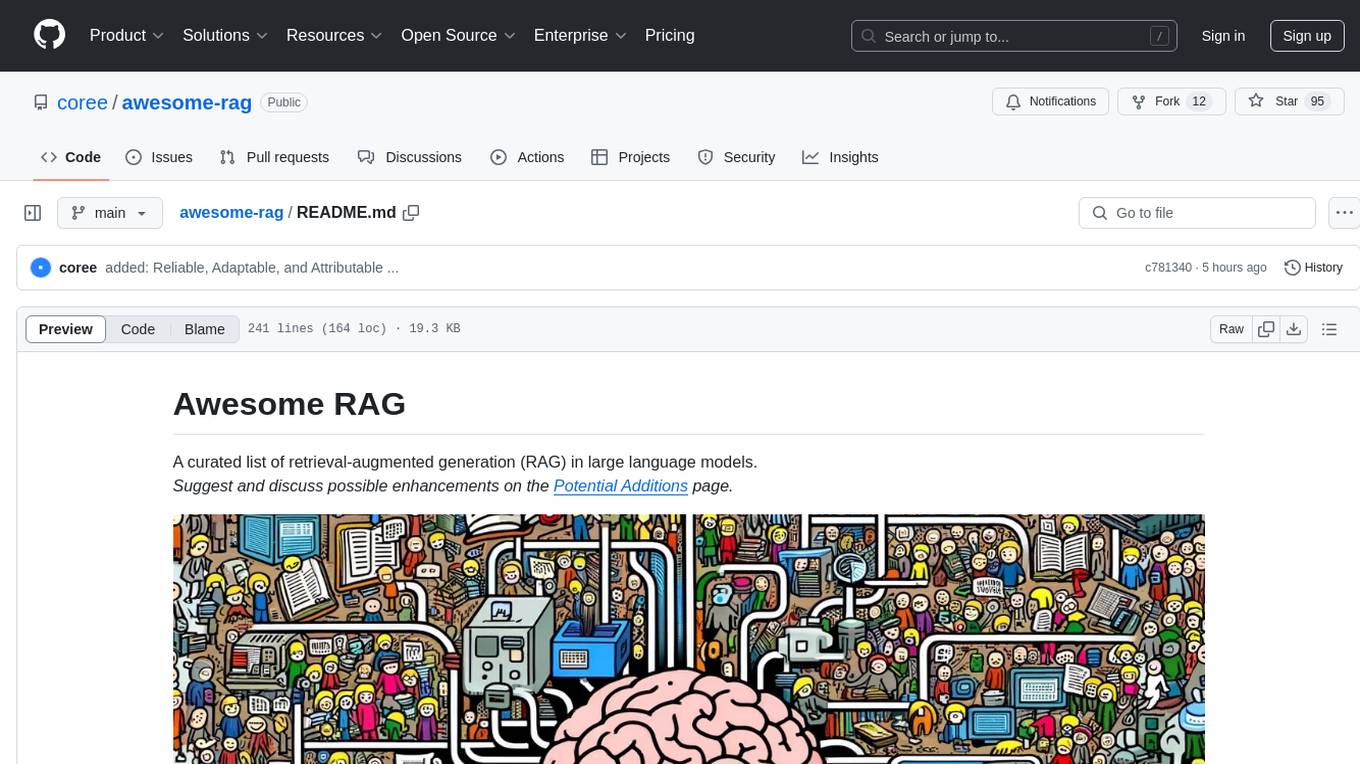
awesome-rag
Awesome RAG is a curated list of retrieval-augmented generation (RAG) in large language models. It includes papers, surveys, general resources, lectures, talks, tutorials, workshops, tools, and other collections related to retrieval-augmented generation. The repository aims to provide a comprehensive overview of the latest advancements, techniques, and applications in the field of RAG.
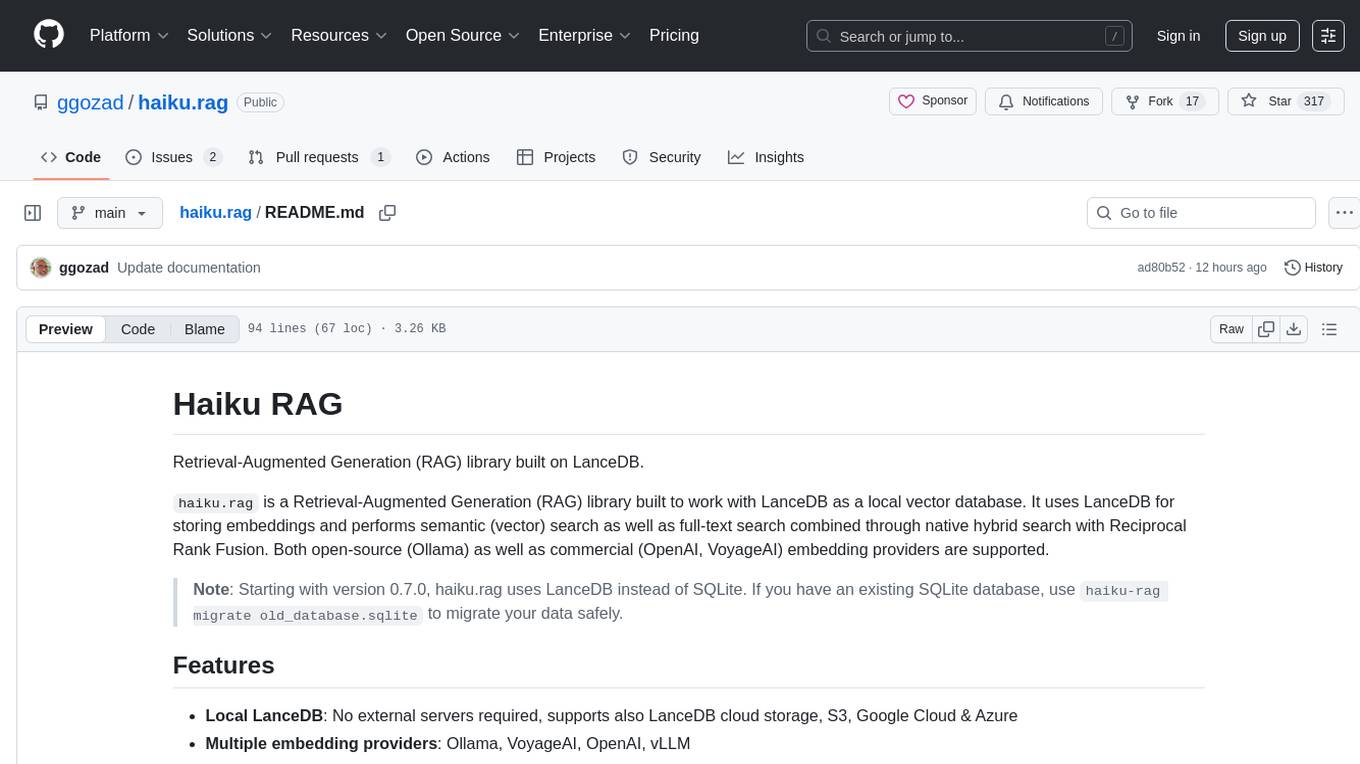
haiku.rag
Haiku RAG is a Retrieval-Augmented Generation (RAG) library that utilizes LanceDB as a local vector database. It supports semantic and full-text search, hybrid search with Reciprocal Rank Fusion, multiple embedding and QA providers, default search result reranking, question answering, file monitoring, and various file formats. It can be used via CLI or Python API, and can serve as tools for AI assistants like Claude Desktop. The library offers features for document management and search, with detailed documentation available.
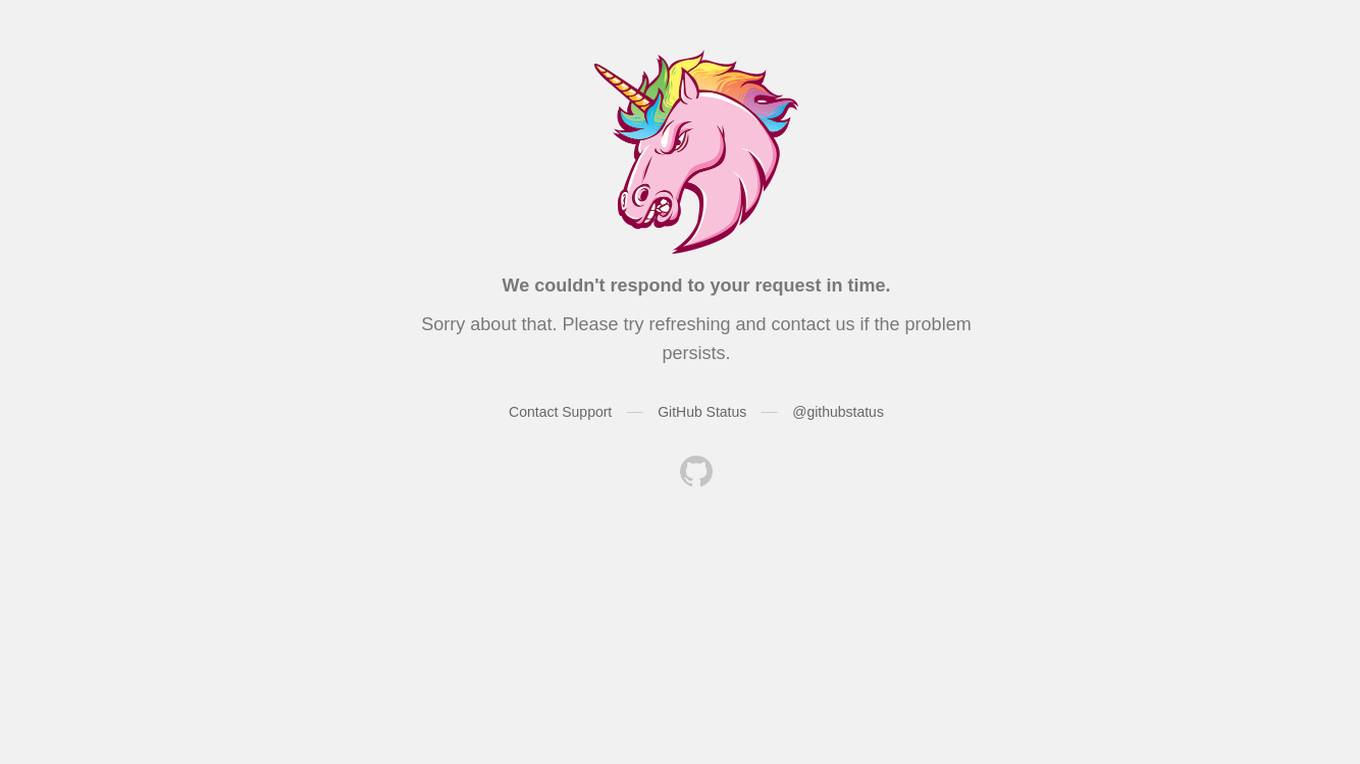
RAG_Hack
RAGHack is a hackathon focused on building AI applications using the power of RAG (Retrieval Augmented Generation). RAG combines large language models with search engine knowledge to provide contextually relevant answers. Participants can learn to build RAG apps on Azure AI using various languages and retrievers, explore frameworks like LangChain and Semantic Kernel, and leverage technologies such as agents and vision models. The hackathon features live streams, hack submissions, and prizes for innovative projects.
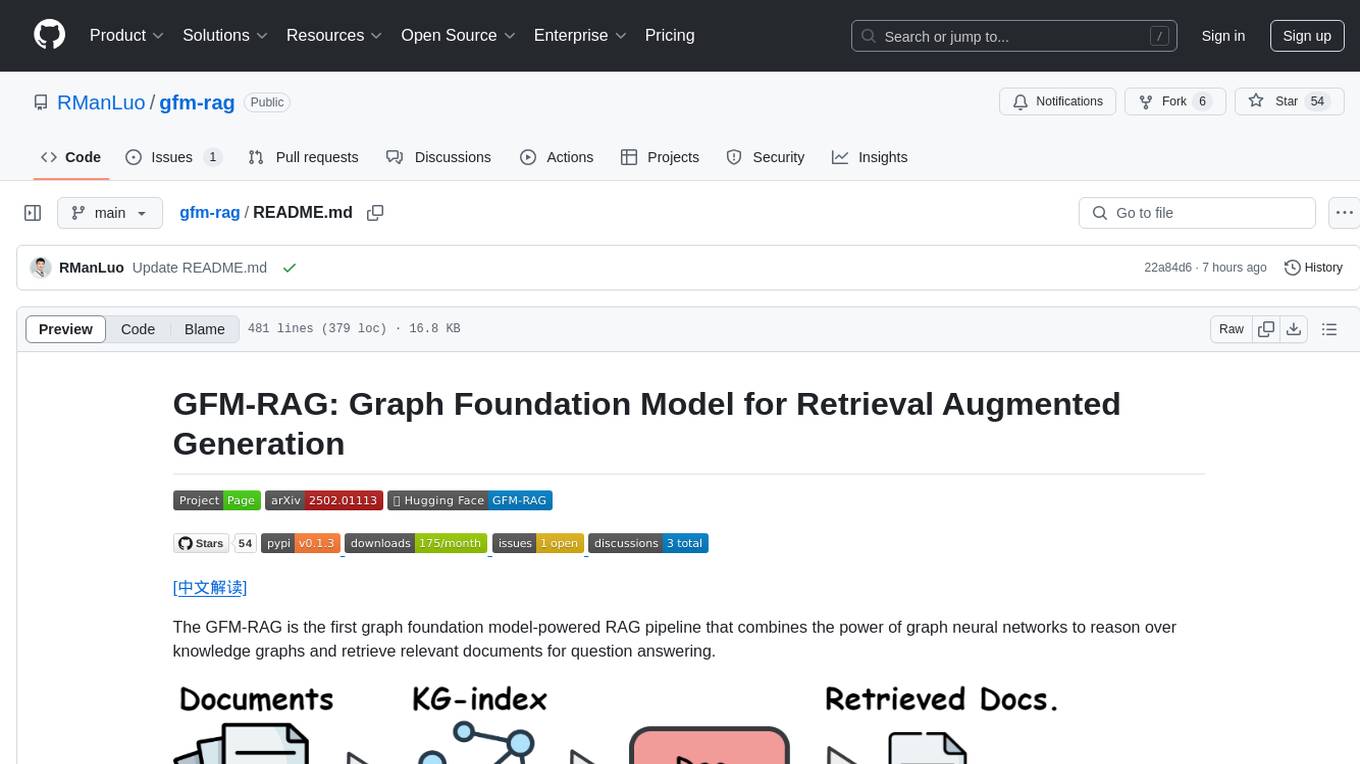
gfm-rag
The GFM-RAG is a graph foundation model-powered pipeline that combines graph neural networks to reason over knowledge graphs and retrieve relevant documents for question answering. It features a knowledge graph index, efficiency in multi-hop reasoning, generalizability to unseen datasets, transferability for fine-tuning, compatibility with agent-based frameworks, and interpretability of reasoning paths. The tool can be used for conducting retrieval and question answering tasks using pre-trained models or fine-tuning on custom datasets.
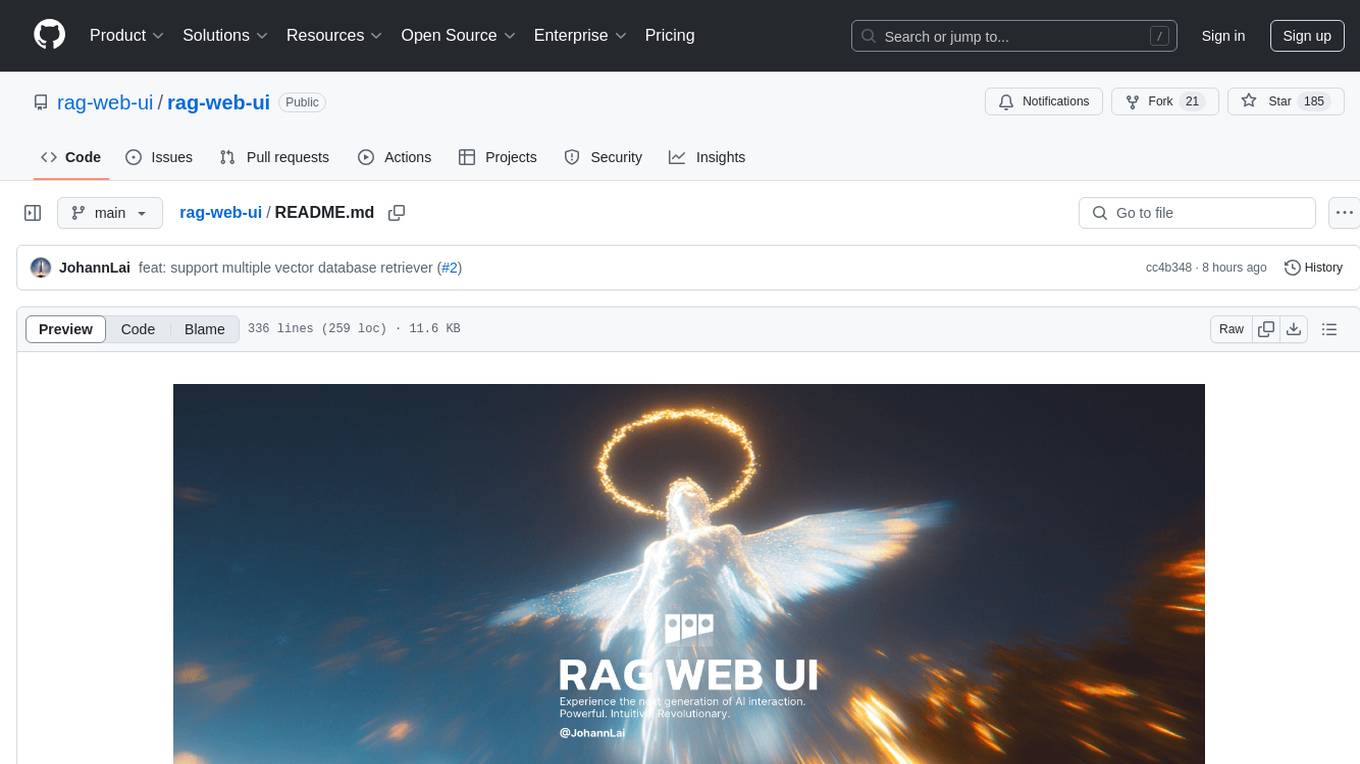
rag-web-ui
RAG Web UI is an intelligent dialogue system based on RAG (Retrieval-Augmented Generation) technology. It helps enterprises and individuals build intelligent Q&A systems based on their own knowledge bases. By combining document retrieval and large language models, it delivers accurate and reliable knowledge-based question-answering services. The system is designed with features like intelligent document management, advanced dialogue engine, and a robust architecture. It supports multiple document formats, async document processing, multi-turn contextual dialogue, and reference citations in conversations. The architecture includes a backend stack with Python FastAPI, MySQL + ChromaDB, MinIO, Langchain, JWT + OAuth2 for authentication, and a frontend stack with Next.js, TypeScript, Tailwind CSS, Shadcn/UI, and Vercel AI SDK for AI integration. Performance optimization includes incremental document processing, streaming responses, vector database performance tuning, and distributed task processing. The project is licensed under the Apache-2.0 License and is intended for learning and sharing RAG knowledge only, not for commercial purposes.
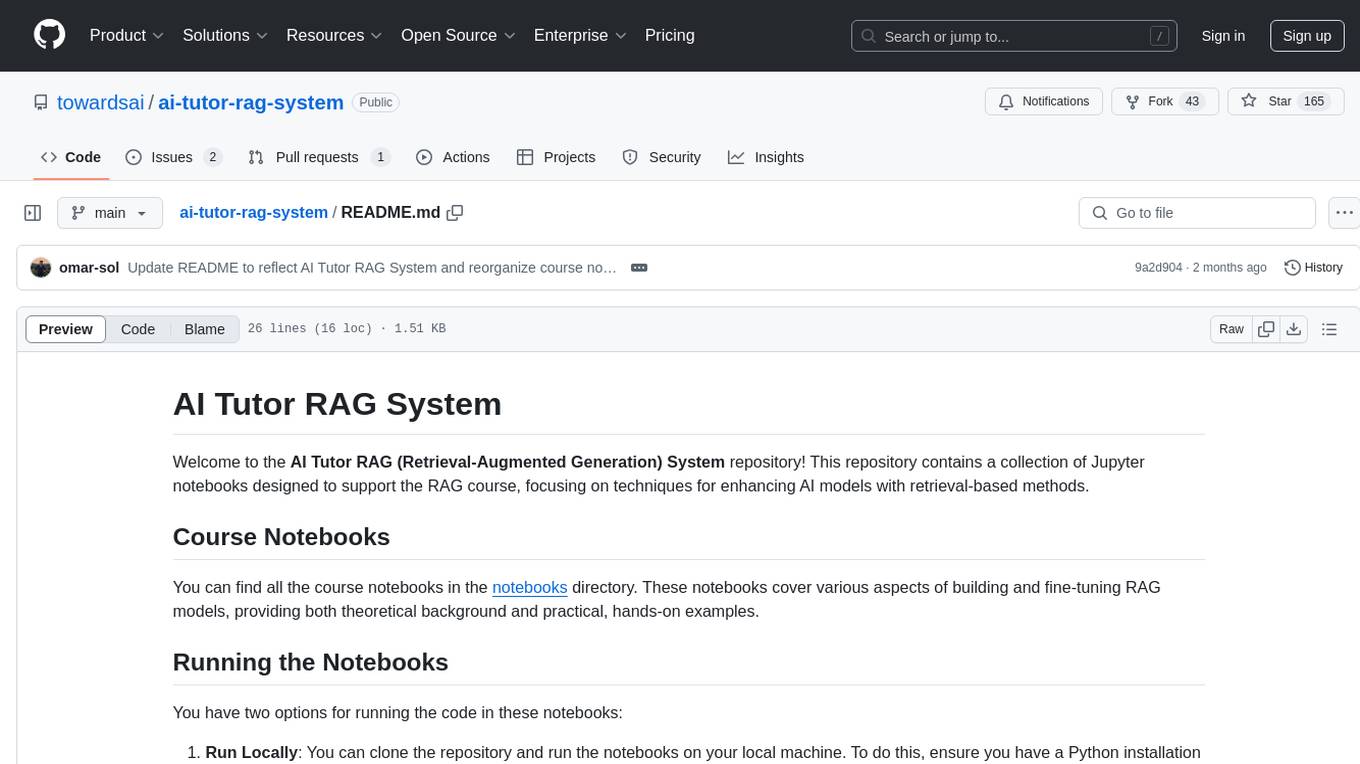
ai-tutor-rag-system
The AI Tutor RAG System repository contains Jupyter notebooks supporting the RAG course, focusing on enhancing AI models with retrieval-based methods. It covers foundational and advanced concepts in retrieval-augmented generation, including data retrieval techniques, model integration with retrieval systems, and practical applications of RAG in real-world scenarios.
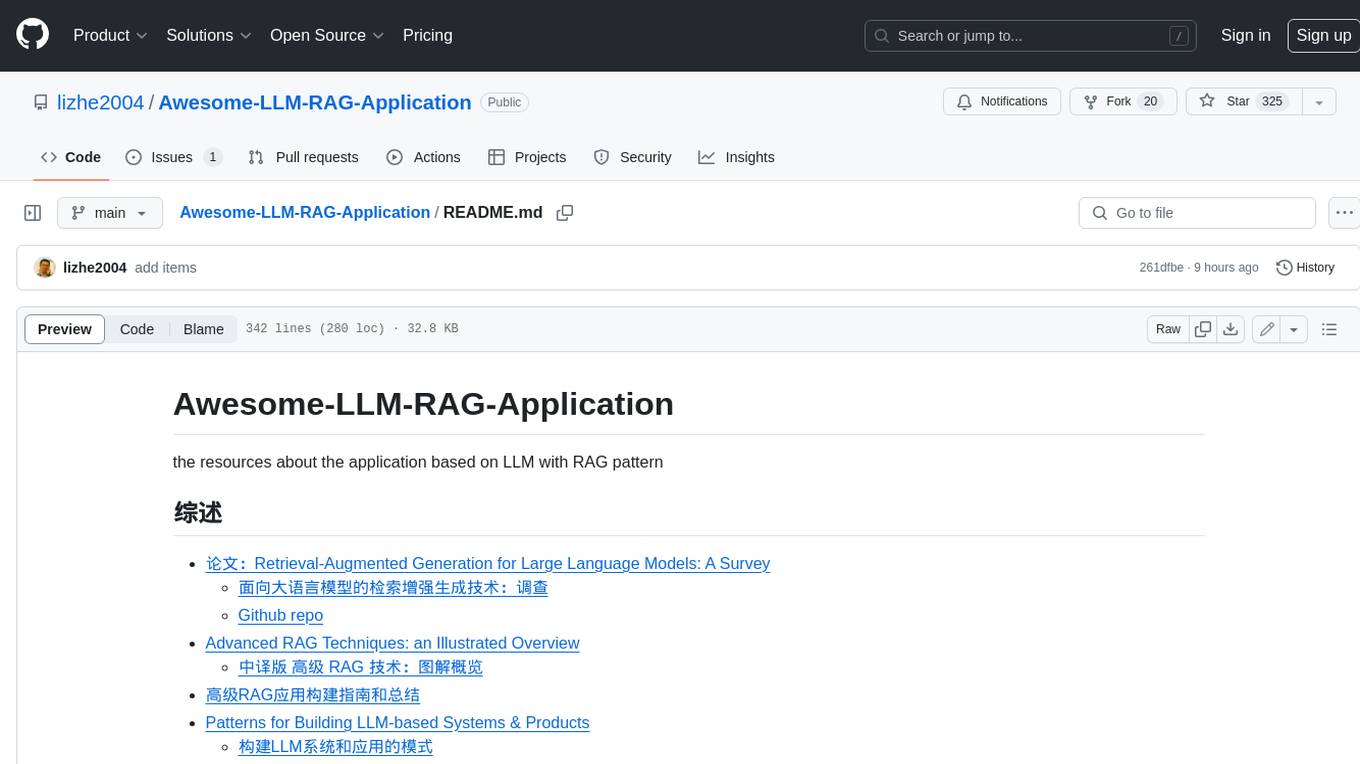
Awesome-LLM-RAG-Application
Awesome-LLM-RAG-Application is a repository that provides resources and information about applications based on Large Language Models (LLM) with Retrieval-Augmented Generation (RAG) pattern. It includes a survey paper, GitHub repo, and guides on advanced RAG techniques. The repository covers various aspects of RAG, including academic papers, evaluation benchmarks, downstream tasks, tools, and technologies. It also explores different frameworks, preprocessing tools, routing mechanisms, evaluation frameworks, embeddings, security guardrails, prompting tools, SQL enhancements, LLM deployment, observability tools, and more. The repository aims to offer comprehensive knowledge on RAG for readers interested in exploring and implementing LLM-based systems and products.
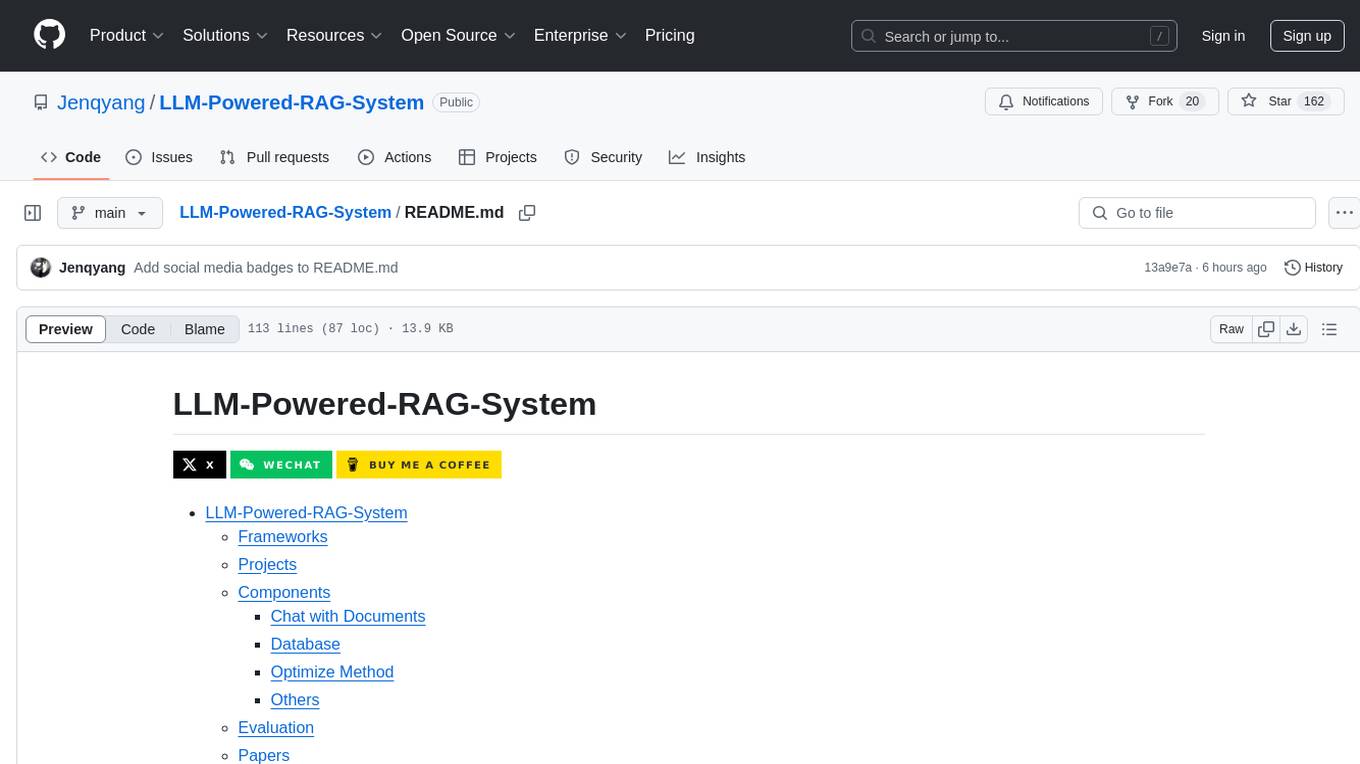
LLM-Powered-RAG-System
LLM-Powered-RAG-System is a comprehensive repository containing frameworks, projects, components, evaluation tools, papers, blogs, and other resources related to Retrieval-Augmented Generation (RAG) systems powered by Large Language Models (LLMs). The repository includes various frameworks for building applications with LLMs, data frameworks, modular graph-based RAG systems, dense retrieval models, and efficient retrieval augmentation and generation frameworks. It also features projects such as personal productivity assistants, knowledge-based platforms, chatbots, question and answer systems, and code assistants. Additionally, the repository provides components for interacting with documents, databases, and optimization methods using ML and LLM technologies. Evaluation frameworks, papers, blogs, and other resources related to RAG systems are also included.
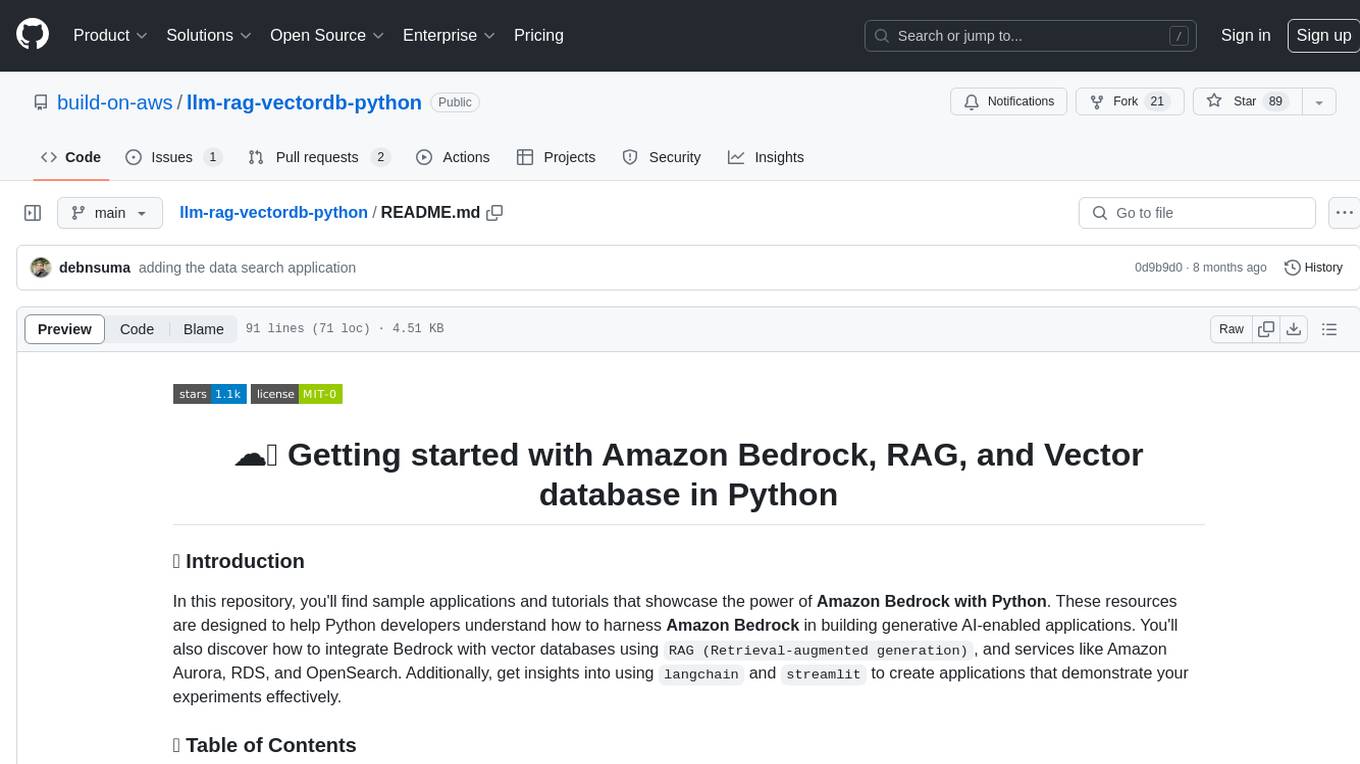
llm-rag-vectordb-python
This repository provides sample applications and tutorials to showcase the power of Amazon Bedrock with Python. It helps Python developers understand how to harness Amazon Bedrock in building generative AI-enabled applications. The resources also demonstrate integration with vector databases using RAG (Retrieval-augmented generation) and services like Amazon Aurora, RDS, and OpenSearch. Additionally, it explores using langchain and streamlit to create effective experimental applications.

awesome-generative-information-retrieval
This repository contains a curated list of resources on generative information retrieval, including research papers, datasets, tools, and applications. Generative information retrieval is a subfield of information retrieval that uses generative models to generate new documents or passages of text that are relevant to a given query. This can be useful for a variety of tasks, such as question answering, summarization, and document generation. The resources in this repository are intended to help researchers and practitioners stay up-to-date on the latest advances in generative information retrieval.
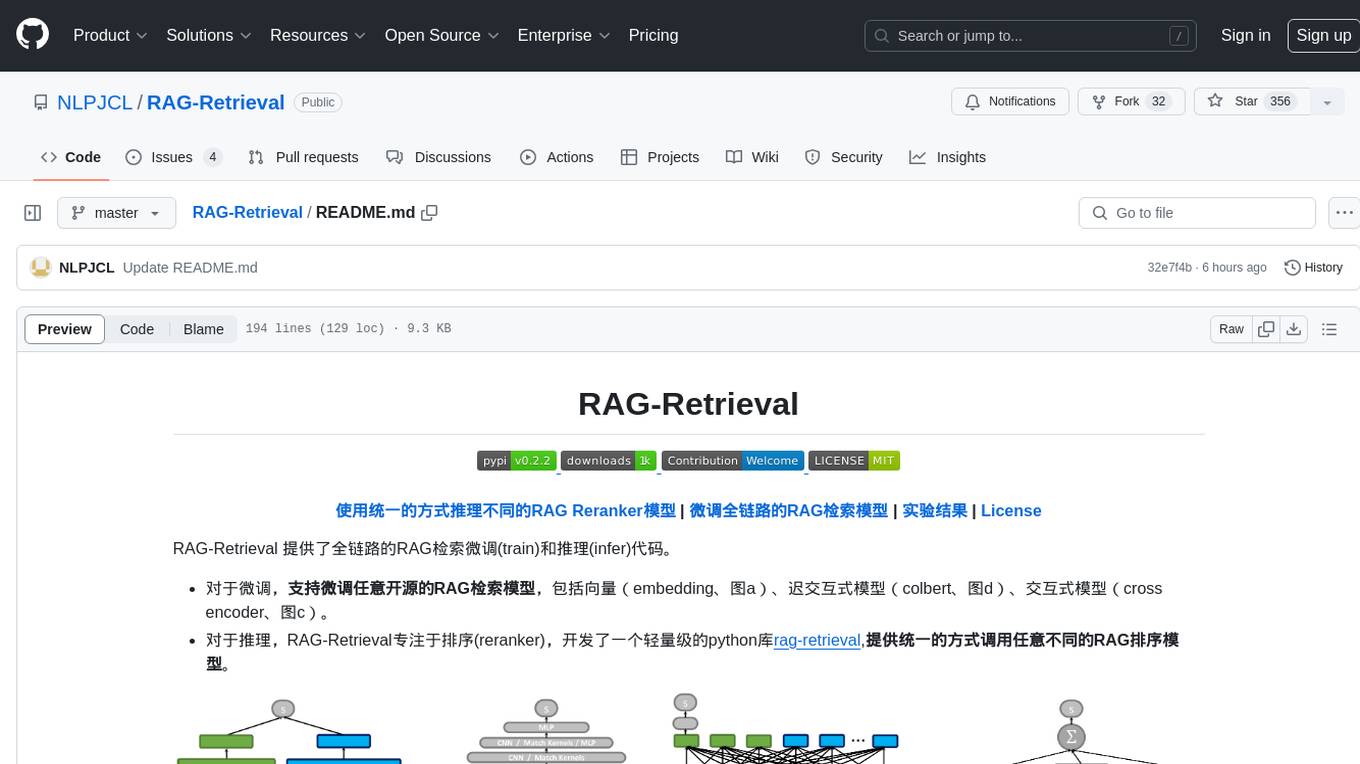
RAG-Retrieval
RAG-Retrieval provides full-chain RAG retrieval fine-tuning and inference code. It supports fine-tuning any open-source RAG retrieval models, including vector (embedding, graph a), delayed interactive models (ColBERT, graph d), interactive models (cross encoder, graph c). For inference, RAG-Retrieval focuses on ranking (reranker) and has developed a lightweight Python library rag-retrieval, providing a unified way to call any different RAG ranking models.
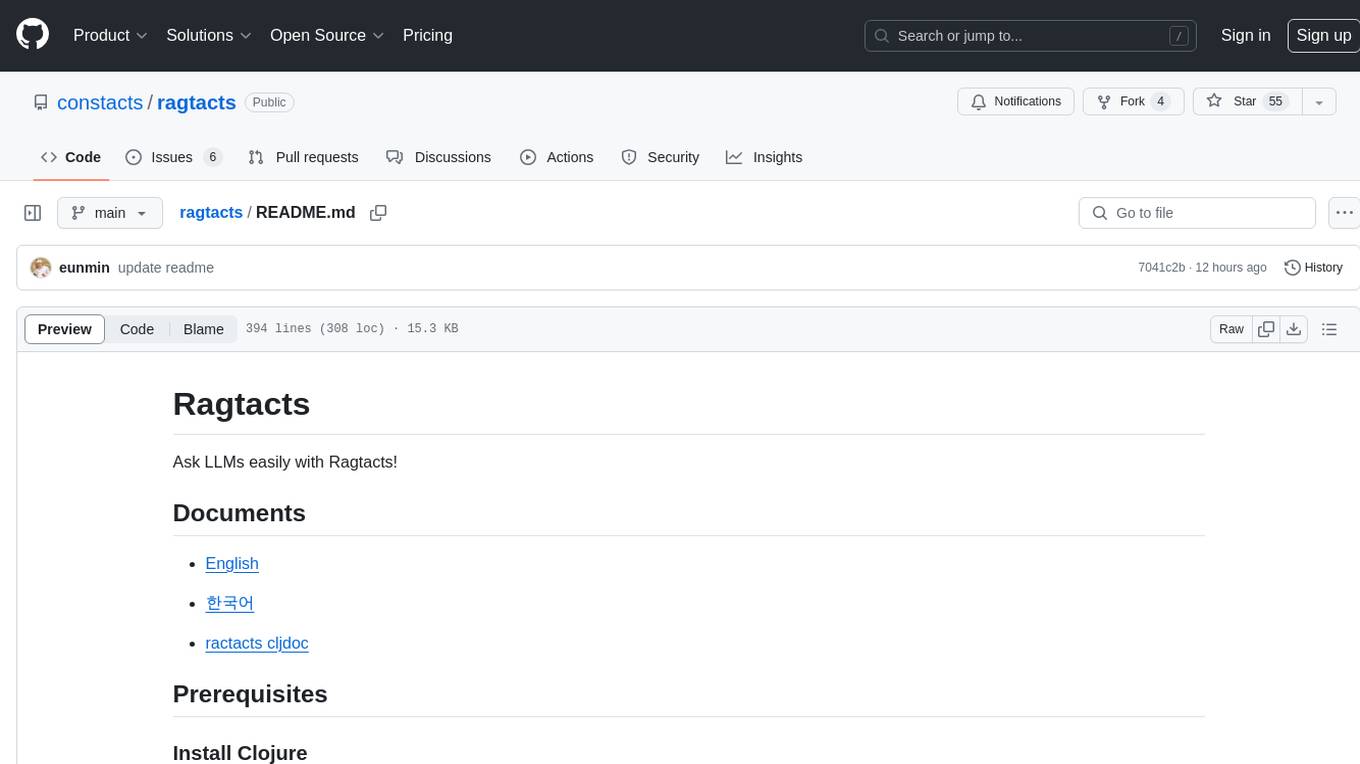
ragtacts
Ragtacts is a Clojure library that allows users to easily interact with Large Language Models (LLMs) such as OpenAI's GPT-4. Users can ask questions to LLMs, create question templates, call Clojure functions in natural language, and utilize vector databases for more accurate answers. Ragtacts also supports RAG (Retrieval-Augmented Generation) method for enhancing LLM output by incorporating external data. Users can use Ragtacts as a CLI tool, API server, or through a RAG Playground for interactive querying.
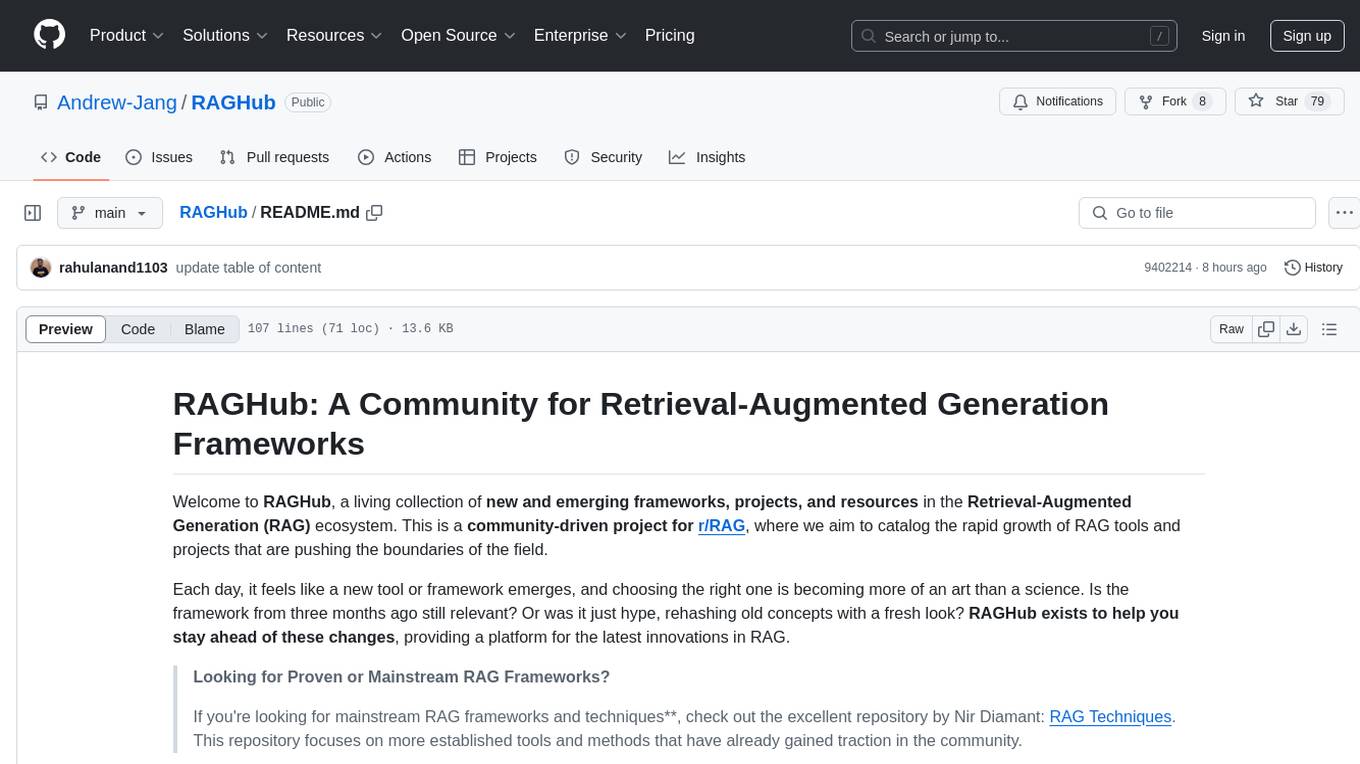
RAGHub
RAGHub is a community-driven project focused on cataloging new and emerging frameworks, projects, and resources in the Retrieval-Augmented Generation (RAG) ecosystem. It aims to help users stay ahead of changes in the field by providing a platform for the latest innovations in RAG. The repository includes information on RAG frameworks, evaluation frameworks, optimization frameworks, citation frameworks, engines, search reranker frameworks, projects, resources, and real-world use cases across industries and professions.
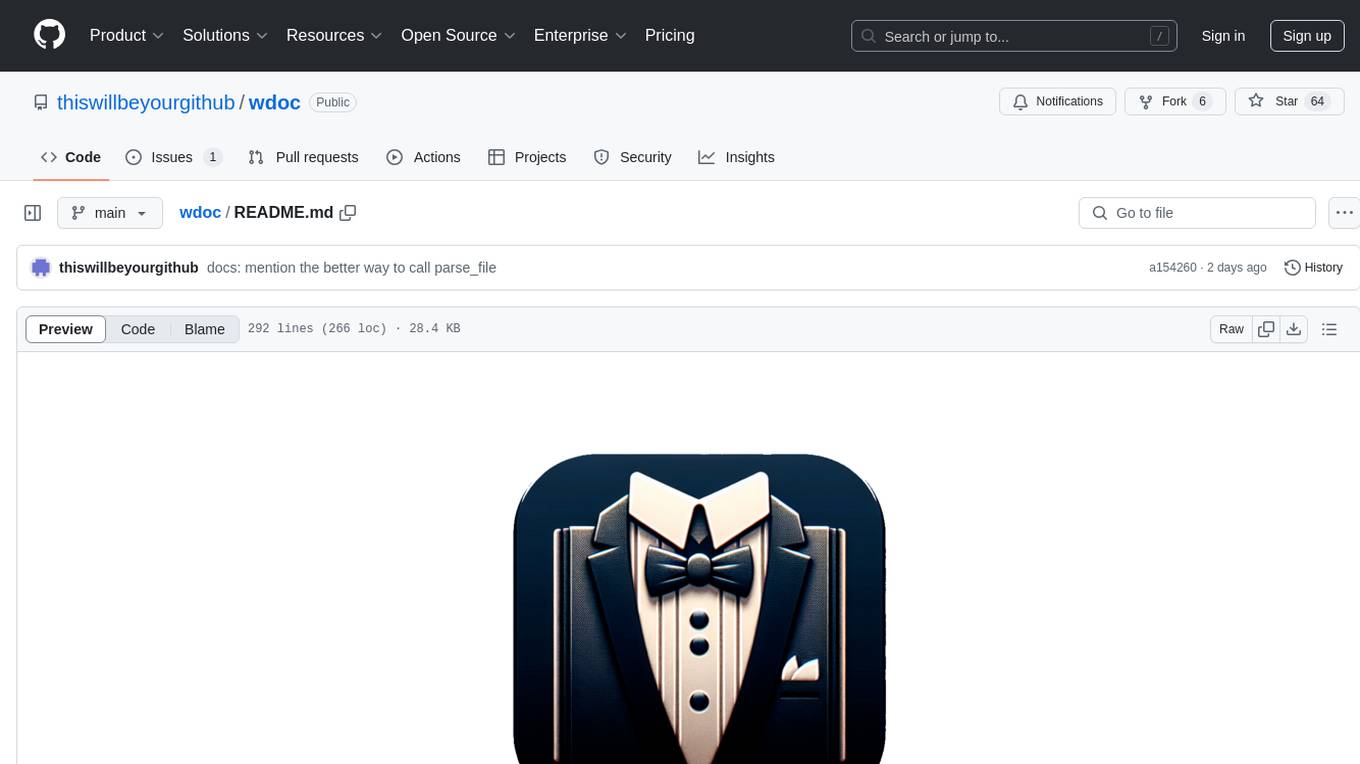
wdoc
wdoc is a powerful Retrieval-Augmented Generation (RAG) system designed to summarize, search, and query documents across various file types. It aims to handle large volumes of diverse document types, making it ideal for researchers, students, and professionals dealing with extensive information sources. wdoc uses LangChain to process and analyze documents, supporting tens of thousands of documents simultaneously. The system includes features like high recall and specificity, support for various Language Model Models (LLMs), advanced RAG capabilities, advanced document summaries, and support for multiple tasks. It offers markdown-formatted answers and summaries, customizable embeddings, extensive documentation, scriptability, and runtime type checking. wdoc is suitable for power users seeking document querying capabilities and AI-powered document summaries.
